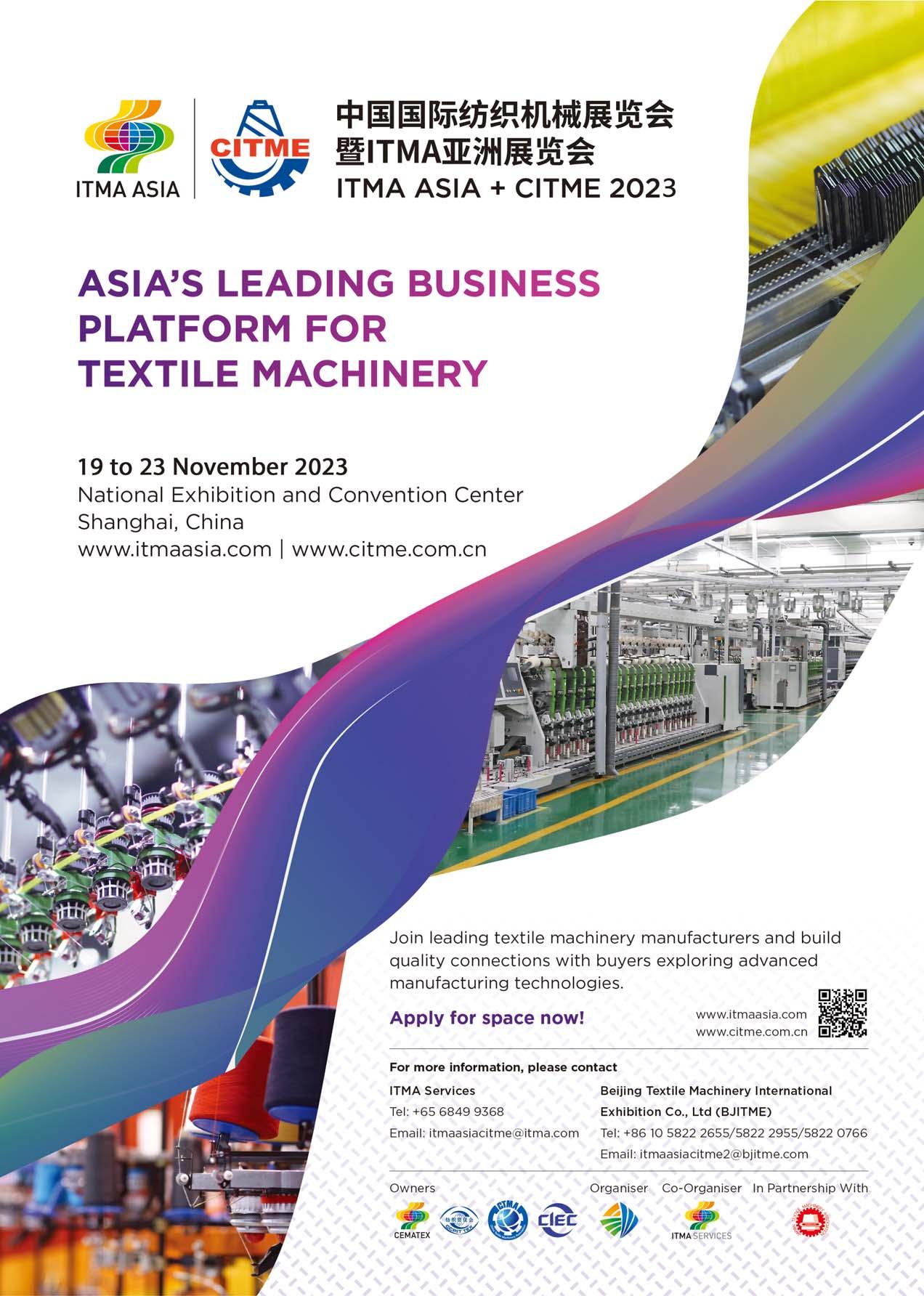

Established 1951 March 2023 Swiss Review


Index 2023
Dates: April 18th to 21st, 2023.
Venue: Palexpo, Geneva, Switzerland.
Techtextil 2023 North America
Dates: May 10th to 12th, 2023
Venue: Georgia USA.
DOMOTEX asiaCHINAFLOOR 2023

Dates: May 29th to 31st 2023.
Venue: NECC, Shanghai, China.
FESPA 2023

Dates: May 23rd to 26th 2023.
Venue: Munich, Germany.
Istanbul Yarn Fair

Dates: June 1st to 3rd, 2023.
Venue: Istanbul, Turkey.
ITMA 2023

Dates: June 8th to 14th, 2023.
Venue: Milan, Italy.
PAKISTAN TEXTILE JOURNAL - March 2023
Johannesburg, South Africa !
Dates: June 18th to 20th, 2023.
Venue: Gallager Convention Centre.
The 92nd Textile Institute World Conference, UK.


Dates: July 3rd to 6th 2023.
Venue: Huddersfield, UK.
IGATEX Pakistan 2023, Karachi



Dates: September 7st to 9th 2023.
Venue: Expo Centre, Karachi.
iCADEX Pakistan 2023, Karachi
Dates: September 7st to 9th 2023.
Venue: Expo Centre, Karachi.
62th Dornbirn GFC Global Fiber Congress


Dates: September 13th to 15th 2023.
Venue: Dornbirn Austria.
ITMA ASIA + CITME 2023

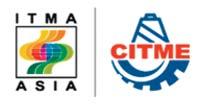
Dates: November 19th to 23rd, 2023.
Venue: NECC, Shanghai, China.
Heimtextil 2024, Frankfurt
Dates: January 09th, to 12th, 2024
Venue: Frankfurt am Main.
DOMOTEX Hannover 2024



Dates: January 11th to 14th 2024.
Venue: Hannover, Germany.
ITM 2024
Dates: June 4th to 8th, 2024.
Venue: Istanbul, Turkey.
HIGHTEX 2024

Dates: June 4th to 8th, 2024.
Venue: Istanbul, Turkey.
JIAM 2024 OSAKA
Dates: Nov. 27th to Nov. 30th 2024.
Venue: Osaka, Japan.
12th ITME
INDIA
2024
Dates: December 2024.
Venue: India Expo Centre & Mart. Noida, India.

2
Calendar of Events

Founded in 1951 by Mazhar Yusuf (1924-2009)

Publisher
Nadeem Mazhar
Editor in Chief
Amina Baqai
Associate Editor
Nimrah Nadeem
Production Manager
Mazhar Ali
Hony-Editorial Board







Dr. Hafizur Rehman Sheikh
Ph.D (UK) F.T.I. (UK)
Syed Mahfooz Qutab
C.TEX, F.T.I (U.K), B.Sc. Fellow I.C.T.T Atlanta, GA; (USA)
Mian Iftkhar Afzal
B.S.N.C State, M.Sc. (Leeds)
C.TEXT.F.T.I (UK)
Dr. Zubair Bandukda
PhD (Textiles), CText ATI


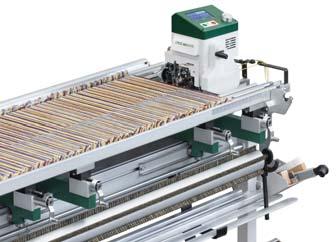


Editorial & Advertising Office
B-4, 2nd Floor, 64/21, M.A.C.H, Miran M. Shah Road, Karachi - Pakistan
Tel: +92-21-34311674-5
Fax: +92-21-34533616
Email: info@ptj.com.pk
URL: http://www.ptj.com.pk








PTJ Europe Ltd.


Correspondence & Mailing address: 93 Fleming Place, Bracknell, RG12 2GN, United Kingdom



Tel: +44 792 2228 721
Registered Office: Dairy House, Money Row Green, Holyport, Maidenhead, Berkshire, SL6 2ND, UK
Registered no. 09141989
AROUND THE WORLD . . . . . . . . . . . . . . . . . . . . . .14 NEWS & VIEWS . . . . . . . . . . . . . . . . . . . . . . . . . .10 EDITOR’S PAGE . . . . . . . . . . . . . . . . . . . . . . . . . . .7 Switzerland remains an important partner for Pakistan’s textile industry TEXTILE BRIEFS . . . . . . . . . . . . . . . . . . . . . . . . . . .8 Vol. LXXII No. 03 March 2023 Rs. 565.00
Printed at: Color Plus Korangi, Karachi. Published by Nadeem Mazhar from D-16, K.D.A. Scheme No.1. Karachi. Available on Gale and Factiva affiliated international databases through Asianet Pakistan
CORPORATE NEWS Unique product created with Swedish innovation . . . . . . . . . . . . . . . . . . . . . .18 FEATURES U.S. Cotton Trust Protocol has tracked over 3 million kilograms of cotton . . . . .19 Groz-Beckert’s WarpMasterPlus – successful presentation in Asia . . . . . . . . . . .20 The LYCRA Company announces latest Higg achievements . . . . . . . . . . . . . . . .21 8 20 19
AND EXHIBITION
490
exhibitors . . . . . . . . . . . . . . . . . . . . . . . . . . . . . . . . . . . . . . . . . . . . . . . . . . . . . .22 18
FAIRS
FESPA Global Print Expo 2023 set to welcome strong line-up of
international
SWISS REVIEW
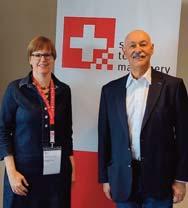


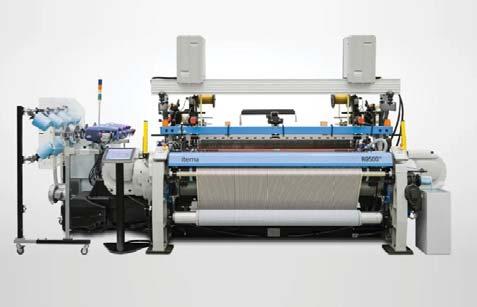



26 48 32 29
Acquisition of the Textile Effects business of Huntsman Corporation . . . . . . . .50 Archroma starts the FiberColors* revolution . . . . . . . . . . . . . . . . . . . . . . . . .52 Archroma Internship program completes 25 years . . . . . . . . . . . . . . . . . . . . .54 Tree Plantation Campaigns . . . . . . . . . . . . . . . . . . . . . . . . . . . . . . . . . . . . .55 Partnering for Educational Cause . . . . . . . . . . . . . . . . . . . . . . . . . . . . . . . . .55 Sustainable Neighborhood . . . . . . . . . . . . . . . . . . . . . . . . . . . . . . . . . . . . . .56 Support towards Fire Safety . . . . . . . . . . . . . . . . . . . . . . . . . . . . . . . . . . . .56 Emergency Response – Floods . . . . . . . . . . . . . . . . . . . . . . . . . . . . . . . . . . .57 Awards and Accreditations . . . . . . . . . . . . . . . . . . . . . . . . . . . . . . . . . . . . .58 50 24
SPECIAL REPORT
ITMA is the greatest show on earth? . . . . . . . . . . . . . . . . . . . . . . . . . . .24 Cornelia Buchwalder, Secretary General of the Swiss Textile Machinery Association. SSM offers sustainable and energy efficient processes . . . . . . . . . . . . . . . . . .26 Three Dedicated Card Clothing Packages by Graf . . . . . . . . . . . . . . . . . . . . . .26 Rieter: Mastering the Short Fiber Challenge . . . . . . . . . . . . . . . . . . . . . . . . .27 TexCircle: The Design of a Circular Ecosystem . . . . . . . . . . . . . . . . . . . . . . . .28 Itema Group offers
weaving solutions . . . . . . . . . . . . . . . . . . . . . . .29 Autefa: Sustainability at forefront with innovative solutions . . . . . . . . . . . . . .30 Bluesign Technologies offers sustainable solution systems . . . . . . . . . . . . . . . .31 SANTEX RIMAR technology for textile finishing of knitted fabrics . . . . . . . . . . .32 Heberlein: Expert for air interlacing and air texturing jets . . . . . . . . . . . . . . .33 Uster outlines the challenges, and solutions for Recycled yarn . . . . . . . . . . . .34 Jakob Müller Group – Gateway to Industry 4.0, the Fourth Industrial Revolution . . .35 Stäubli Textile exhibiting impressive innovations at ITMA 2023 . . . . . . . . . . . .36 Loepfe sensors avoid material and energy wastage . . . . . . . . . . . . . . . . . . . . .37 Swinsol Compact Spinning solutions . . . . . . . . . . . . . . . . . . . . . . . . . . . . . . .38 Luwa: New developments for Axial Flow Fan to reduce energy consumption . . .39 Retech innovations under the blue thread theme related to Sustainability . . . .40 Saurer: Autocoro with new patented rotor cleaning . . . . . . . . . . . . . . . . . . . .41 Steiger shares action plan for a sustainable future . . . . . . . . . . . . . . . . . . . . .42 Crealet presents individual and comprehensive solutions . . . . . . . . . . . . . . . .43 Benninger: Road to Net Zero in continuous wet processing & jet dyeing . . . . . .44 Swissmem Press Conference Glimpses . . . . . . . . . . . . . . . . . . . . . . . . . . . . .46 Day out at the Cheese Factory and Berne city . . . . . . . . . . . . . . . . . . . . . . . .48
Why
advanced

important partner for Pakistan’s textile industry


Switzerland is known worldwide for its precision watches, cheeses and financial services. However, Swiss competence is not limited to these well known sectors. Equally strong are the Swiss companies in the textile technology, testing equipments, chemicals and service sectors. What differentiates Swiss companies from others is their tradition and passion for innovation, precision engineering as well as their focus on high productivity and respect for the environment.
In the world of textile chemicals, Archroma is another great example of the commitment of Swiss companies to Pakistan. With a firm commitment to the environment Archroma has developed world’s first Aniline free indigo, an achievement possible with the efforts of the dedicated team of Archroma.

Switzerland is one of the most competitive economies in the world. They have always strengthened their trade relations with Pakistan. The Swiss companies intend to increase their investments in Pakistan, while the current Government of Pakistan is continuously improving its imports policy to allow liberal imports of textile machinery, industrial raw materials, capital goods, and essential consumer goods. Over the centuries, the sheer innovative spirit of the Swiss has been demonstrated many times through inventions spanning various fields. Their impact on the global textile industry has been among the most notable, with continuous and significant developments.
Our current issue of March 2023, is devoted to Switzerland and in this special edition, our readers will find reports and news about Swiss companies and their innovative technological solutions for Pakistan’s textile industry. This edition also covers the Pre ITMA Press conference held during 17 to 18 March at Bern, organized by Swissmen.
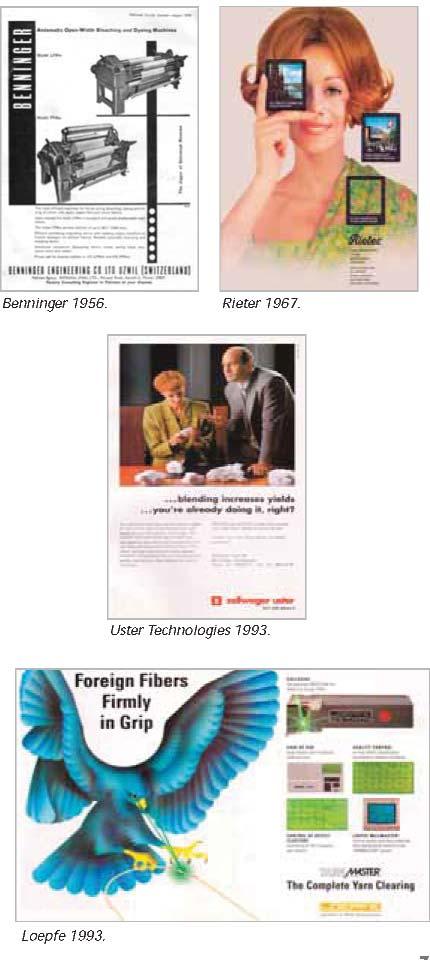
Looking ahead to ITMA 2023 in Milan (June 8-14), Cornelia Buchwalder, Secretary General of the Swiss Textile Machinery Association explores the real importance of ITMA as a driver of global textile progress during an interview published here. Ernesto Maurer, CEMATEX and Swissmem President comments about the need for the industry to adopt sustainability business practices are also noteworthy. It's encouraging to see that Swiss companies are taking a leadership role in this area and that they are committed to making a positive impact on the environment as seen during the panel discussions. ITMA 2023 is perfectly timed to offer Swiss exhibitors an opportunity to showcase these new products and cutting-edge technologies.
The participation of various Swiss companies at the Swissmen conference, including Saurer, Steiger Participations, Autefa Solutions, Swinsol, Santex Rimar Group, Jakob Muller, Crealet, itema (Switzerland), Stäubli Sargans, Uster Technologies, Rieter, Rieter Components (incl. Bräcker, Graf, SSM), Luwa, Retech, Heberlein, Loepfe, Benninger, Bluesign and Texcircle Project, highlights the close partnership between Swiss and Textile Trade Press, such as Pakistan Textile Journal, the oldest textile trade publication in Pakistan. It's great to see that these companies are working together to bring innovative solutions to the textile industry.
Established 1951 March 2023 Swiss Review
Switzerland remains an
EDITOR’S PAGE 7
March 2023.
1
Textile industry has asked the State Bank of Pakistan to extend the moratorium on debt under TERF and LTFF from June 1, 2023, to December 2023 to avoid large-scale NonPerforming Loans (NPLs) and severe negative impacts on the banking sector.

taker Minister for Industry and Commerce SM Tanveer.
4
Amidst of government attempt to save every penny, Experts have raised concerns that cotton would also need to be imported as its production has fallen short of the target.
started to close all operations and decline in textile exports is increasing day by day.

7
APTMA patron-in-chief Gohar Ejaz alerts Prime Minister Shehbaz Sharif that 10 million textile workers will be unemployed in Punjab if the textile sector continues to suffer.
2
Textile exports continued a downtrend to a fifth consecutive month in February by falling 29.9 percent year-on-year to $1.18 billion, lowest in last 21 months, data from Pakistan Bureau of Statistics.
3
A delegation led by Hamid Zaman, Chairman All Pakistan Textile Mills Association commenced a meeting with care-
5
PTEA fears that it will not be possible to meet target of USD 25 billion in export for the year if the country’s financial conditions continues to decline.
6
Report by All Pakistan Textile Mills Association (APTMA) concludes that the country is struggling to support the backbone of the economy “The textile Industry” and outcome of this can be seen as mills have
Textile Briefs International
1
According to the official data released by General Administration of Customs China (GACC), the country shipped US $ 21.68 billion worth of apparel and accessory, falling by 14.70% on year to year basis in January to February period of 2023.
2
USA’s cotton consumption forecast is down more than 500,000 bales from the previous month due to lower consumption in Pakistan, Turkey, Bangladesh, and Indonesia due to an array of countryspecific factors.
North Carolina State University (United States) researchers discovered that the blended cotton and polyester fabric can be separated using enzymes .
3
China is important trading partner for Pakistan, with Chinese companies increasingly sourcing garments from Pakistan due to their competitive prices. In January- February of this year, men’s garments exports from Pakistan to China crossed $4.36 million while in 2022 in the same period, it was $3.21 million, showing an increase of 36%.
8
9
Pakistan’s textile industry adapting to Renewable Energy solutions is not only cost and resource effective but also enhances the sector’s overall compliance to the global standards on energy efficiency and industrial de-carbonization, such as those imposed by the European Green Deal.
10Pakistan and Uzbekistan signed a one billion dollar trade agreement to encourage exchange of goods and services. The deal was sealed at the 8th meeting of the Pakistan-Uzbekistan Intergovernmental Commission on Trade-Economic and Scientific-Technical Cooperation (IGC) held in Tashkent.
4
China exported US $ 40.84 billion textiles and apparel in JanuaryFebruary 2023 as compared to US $ 51.11 billion in January-February 2022 period, noting a 20.10% yearly fall.
5Bangladesh Bank has imposed restrictions on opening of letters of credit due to ongoing dollar crisis in the banking sector. "Declining stocks of raw materials amid commercial banks' unwillingness to open LCs might severely hamper production and exports of textile and apparel items," says Bangladesh Textile Mills Association.
6
Turkiye’s textile and apparel exports in 2022 were valued at
$35.25 billion. Turkiye has strong competitiveness in the global market in the apparel and home textiles segment. The Turkish clothing industry is the sixth largest supplier in the world with a share of 3.7%.
7
A fact-finding study of the use of secondhand clothing by Greenpeace found that Tanzania and Kenya are flooded with huge amounts of textile waste daily that have severe consequences for people and the environment. The findings were presented in a report titled Poisoned Gifts: From donations to the dumpsite: textiles waste disguised as secondhand clothes exported to East Africa.
8
The European Commission invests 16 million USD in textile recycling project in hope of a sustainable future.
The tExtended project is spearheaded by the stateowned- VTT Technical Research Centre of Finland. It intends to integrate recycling, waste valorization and data technologies and bring the current textile recycling from 1% to 80%, resolving an issue that’s been a challenge for a circular economy.
The Indian Institute of Technology has developed a green technology called “air nano-bubble” that can be a game changer for water requirements of the textile sector.
9

8 PAKISTAN TEXTILE JOURNAL - March 2023
Textile Briefs National

A Ray of hope for the muchneglected textile sector
A delegation led by Hamid Zaman, Chairman All Pakistan Textile Mills Association commenced a meeting with SM Tanveer, Caretaker Minister for Industries, Commerce and Energy. During the meeting the Minister was briefed on problems of electricity connections for textile sector, tax refund and social security.
APTMA chairman said that the policy of closure of markets should be made in consultation with the stakeholders regarding the saving of energy.
The Minister assured him of solving problems of the textile sector. The caretaker Minister SM Tanveer said that the textile sector has a key position in the national economy. The textile sector is also a major source of employment. He said this sector is important in the economy and the problems facing the sector will be solved on priority. SM Tanveer said that the government will not let stop the wheel of the industry in any case.
Cotton production fails to meet the set target
According to the figures by Pakistan Cotton Ginners Association (PCGA) the country produced over 4.76 m bales by Jan 31, against over 7.42 m bales produced by the same time last year - a dip of 35.8pc or 2.66m bales. This has raised many concerns regarding production and availability of raw cotton among the textile sector.
Experts in the field says that the requirement of raw cotton in textile sector is approximately 12 M bales but the country was only able to produce approximately 5 million bales and will need to import 7 million bales of cotton to meet the gap between demand and production.

Naseem Usman, Karachi Cotton Brokers Forum Chairman says, “The country will only able to produce approximately 5 million bales this year and the requirement of raw cotton in textile sector is approximately 12 million bales, so the country will need to import 7 million bales of cotton to meet the gap between demand and production.”
He further added, “Currently, agreements have been signed for the import of 5.5 million bales.”
Textile spinners have so far purchased 4.175 million bales, while in the previous year, they had bought over 7.233 million bales during this period.
Mr Usman said a further hike in rates and difficulty in importing white lint due to the US dollar’s appreciation against the rupee is another challenge. He concluded that the delay in the opening of letters of credit has already compounded supply chain issues.
Pakistan Textile Exporters Association fears for future of textile
The PTEA fears that meeting the export targets in the current fiscal would be more difficult in the prevailing circumstances. Worsening international economic situation, primarily because of the Ukraine crisis, combined with floods in Pakistan, had negatively impacted the already inefficient supply chain of the country. Textile items are the backbone of the country’s overall exports. The textile sector accounts for more than 50% of the industrial workforce in Pakistan. Textile exports in the previous financial

PAKISTAN TEXTILE JOURNAL - March 2023 10 News & Views
year contributed 60.92% of the country’s total exports of $31.76 billion. The textile exports target for the current fiscal has been set at $25 billion.
Textile sector continues to suffer

Pakistan’s textile sector exports witnessed a significant decline of 12.4%, clocking in at $1.36 billion in January 2023 in comparison to $1.55 billion recorded in the same month of the previous year.
According to report by All Pakistan Textile Mills Association (APTMA) the country is struggling to support the backbone of the economy “The textile Industry” and outcome of this can be seen as mills have started to close all operations and decline in textile exports is increasing day by day. The APTMA’s report raises concern within the country as textile exports in the first 7 months of FY23 decreased by 8% to $10.08 billion, declining from $10.93 billion recorded in 7MFY22.
During an interview recently Asif Inam, chairman APTMA said, “Worsening international economic situation primarily caused by the Ukraine crisis combined with floods in Pakistan has negatively impacted the already inefficient supply chains of the country. Flooding in dozens of districts of Pakistan has destroyed a wide swath of agricultural land.”
“While the industry requires 14 million bales, the country could only produce 5 million bales of cotton domestically, to meet this gap cotton needs to be imported; however, the Forex issues in the economy have curtailed imports of cotton and other essential inputs for exports. The issue of raw material clearance from the ports remains unresolved owing to unavailability of forex and therefore mills are currently unable to obtain cash against documentation and are closing down owing to the shortage of raw materials,” he concluded.
Pakistan and Uzbekistan sign trade deals
According to a Tweet, the Economic Affairs Division, Government of Pakistan, “Both countries signed a one billion dollar trade agreement to encourage exchange of goods and services.”
The deal was sealed at the 8th meeting of the Pakistan-Uzbekistan Inter-governmental Commission on Trade-Economic and Scientific-Technical Cooperation (IGC) held in Tashkent.
The meeting mainly focused on bilateral economic cooperation in various sectors, including commerce and trade, banking, industries and production, investment, textile industry, energy, oil and natural resources, transportation and communication, agriculture and tourism and culture development.
Finance Minister Ishaq Dar was leading the delegation to thrash out the trade agreements, which cover cooperation in fields, including trade, banking, industries, energy and agriculture, the ministry added.
The IGC meeting was co-chaired by Uzbek Minister of Investments, Industry and Trade, Laziz Kudratov and Dar.
The continuous efforts by both countries to encourage closer ties, especially in the fields of trade, transport, banking, and agriculture, were appreciated by the Uzbek side, the officials stated.
According to the statement, Dar appreciated the “deeper interests by the Uzbek side and strengthening the relationship and lauded progress already made” in the field of transport and trade. He also welcomed the Uzbek side to explore areas in automobiles, information technology and natural minerals.
“Textile sector on brink of default.” APTMA writes letter to the State Bank Of Pakistan

“The textile sector has reached the brink of default in the wake of its inability to service the loans it received under TERF (Temporary Economic Refinance Facility) and LTFF (long-term facing facilities) which may also lead to a possible banking crisis”, wrote APTMA to the State Bank of Pakistan.
The State Bank of Pakistan (SBP) during the PTI era provided the TERF and LTFF facilities to help industrialists to install more textile units and expansion of units for more growth in exports of the country. However, because of the ongoing LCs crisis, stuck-up consignments of imported cotton at the ports owing to the dollars liquidity crunch and withdrawal of RCET by the government in line with IFM diktat, all the new and expansion units in the sector have become non-functional. This has led
to immense pressure on export-reignited units which are unable to generate funds to pay even interest on the loans, leading to massive defaults, curtailment capacity and a possible banking crisis.
The textile industry has asked the State Bank of Pakistan to extend the moratorium on debt under TERF and LTFF from June 1, 2023, to December 2023 to avoid large-scale NonPerforming Loans (NPLs) and severe negative impacts on the banking sector.
APTMA further wrote, “Banks are not opening LCs or retiring cotton imports, which had led to the non-functioning of the textile units. Now loyal international customers are reluctant and asking Pakistani suppliers whether or not they will be able to meet deadlines and ship orders on time resulting in a loss of export orders.”

Garment exports to China register increase by 33% in 2022.
“Pakistan’s garment exports to China have seen a remarkable increase of 33% in the past year which is a significant achievement as it strengthening of economic ties between the two countries”, said Ghulam Qadir, Commercial Counsellor, Pakistan Embassy Beijing.Pakistani menswear popularity is growing day by day in China, this fashion trend is one of the reasons for this exceptional growth.
“Chinese manufacturers are increasingly trusting Pakistan as a source of quality textiles and garments at competitive prices, and this trend has also been bolstered by government initiatives such as free trade agreements that have facilitated increased trade between the two countries.” Ghulam said.
News & Views 12 PAKISTAN TEXTILE JOURNAL - March 2023
He further elaborated that Pakistani men’s garments annual exports to China in 2022 were $28.66 million, up from $21.62 million in 2021, a nearly 33% increase.
Men’s or boys’ cotton trousers, community code (61034200), worth $17.94 million, remained the top items, while it was $12.59 million in 2021. Similarly, men’s or boys’ trousers and breeches with community code 62034290 are worth $7.22 million, whereas this item exported from Pakistan was worth $6.55 million in 2021.”
This increase in exports is also beneficial for Pakistan’s economy, as it will bring more foreign exchange into the country and help boost its GDP.
Lastly he concluded, “This surge in exports is a testament to the strength of Pakistan’s garment industry and its ability to meet global standards. It also highlights how China is becoming an increasingly important trading partner for Pakistan, with bilateral trade between the two countries increasing rapidly over recent years.”
Men’s garments export to China rises 36pc in first two months of 2023.

Pakistani men’s garment export to China rose by 36% in the first two months of 2023 and this growth is attributed to the robust manufacturing capabilities and high quality of Pakistani men’s garments, said Ghulam Qadir, Commercial Counsellor, Pakistan Embassy Beijing.

China has been an important trading partner for Pakistan, with Chinese companies increasingly sourcing garments from Pakistan due to their competitive prices. The rise in exports is also attributed to the increased demand for Pakistani apparel from Chinese consumers, who have been looking for more stylish clothing options, he told China Economic Net (CEN). In JanuaryFebruary of this year, men’s garments exports from Pakistan to China crossed $4.36 million while in 2022 in the same period, it was $3.21 million, showing an increase of 36%.
The top products were men’s or boys’ trousers of cotton community code (61034200) worth $2.57 million whereas
January-February of 2022 was $1.27 million, he stated. It is worth mentioning that Pakistani men’s garments annual exports to China in 2022 were $28.66 million while in 2021 it was $21.62 million, an increase of nearly 33%.
Men’s or boys’ trousers of cotton, community code (61034200) worth $17.94 million remained the top items while in 2021 it was $12.59 million. Pakistan’s T-shirt exports to China also reached $5.53 million in the first two months of 2023, up more than 106% compared to the same period in 2022. Overall, Pakistan’s export to China crossed $446 million in the first 2 months of 2023.
News & Views 13
AFRICA

Textile waste to Africa have severe consequences
A fact-finding study of the use of secondhand clothing by Greenpeace found that Tanzania and Kenya are flooded with huge amounts of textile waste daily that have severe consequences for people and the environment. The findings were presented in a report titled Poisoned Gifts: From donations to the dumpster: textiles waste disguised as second hand clothes exported to East Africa.
The report mentioned: "In Kenya, 185,000 tons of second-hand clothes were imported in 2019, and according to Africa Collect Textiles and other local sources local sources, 30 to 40% of second-hand clothes are of such bad quality that it cannot be sold anymore. This means that 55,500 to 74,000 tons of it was actually textile waste. This amounts to about 150–200 tons of textile waste a day."

These countries do not have the requisite infrastructure to deal with these “poison gifts” and the results in textile waste dumped everywhere, some of it is burnt leading to air quality issues, and a lot of it is dumped in rivers and drains, clogging them right away.
That's not all. As the report points out, "The decomposing clothes release methane, a harmful greenhouse gas that contributes to climate change; synthetic fabrics like polyester and Lycra can take hundreds of years to biodegrade.”
Greenpeace Germany's toxics campaigner, Viola Wohlgemuth, who visited the two countries, wrote on the Greenpeace website: "Fast fashion brands are promoting circularity, but reality shows that this is still a myth. Nowhere is the failure of the fast fashion linear business model more visible than in the countries where many of these cheap clothes end up once their short lives are over: on huge dump sites, burnt on open fires, along riverbeds and washed out into the sea, with severe consequences for people and the planet."
It's also a question of trading practices which are weighed heavily in favour of the Global North. Wohlgemuth wrote: This effectively turns Global South
countries into dumping grounds for fast fashion waste, while doing little or nothing to support or develop the clean manufacturing of local textiles and garment production that is needed in these countries, using the same high standards and best practices that are required in Europe."
There are, of course, success stories in both Tanzania and Kenya where novel initiatives are creating positive solutions and developing their own form of circularity. Examples include: Anne Kiwia (Tanzania), Suave (Kenya), Mama Hokororo (Tanzania) and Africa Collect Textiles (Kenya).
BANGLADESH

Restrictions for the opening of LCs lead to downfall of textile industry
Bangladesh Bank has imposed restrictions on opening of letters of credit due to ongoing dollar crisis in the banking sector. The Bangladesh Bank, earlier in July 2022, imposed a 100% cash margin for opening letters of credit (LCs) on cars, electronics, gold, precious metals, RMG, and pearls, among other items, to discourage imports in a bid to keep the country's currency and debt management
more integrated and stable. This move has led to a decline in the imports, and in turn has increased the prices of all kinds of commodities in the country.
"Declining stocks of raw materials amid commercial banks' unwillingness to open LCs might severely hamper production and exports of textile and apparel items," says BTMA.
The Bangladesh Textile Mills Association (BTMA) recently expressed concern that the situation of most commercial banks being averse to opening letter of credit (LC) under the Export Development Fund (EDF), Usance Paid At Sight (UPAS) and deferredpayment systems due to dollar shortage may lead to suspension of production of basic raw material for apparel.
The domestic spinners may continue production activities for the next three months till the existing raw materials stock lasts, added BTMA.
The Bangladesh Knitwear Manufacturers and Exporters Association (BKMEA) also expressed that they facing similar problems.
In a letter to the central bank, signed by BTMA president Mohammad Ali Khokon, the association said factories could not import required raw materials like cotton, polyester staple fibre (PSF) and Viscose staple fibre (VSF) to feed the readymade garment (RMG) exporters
Around the World 14 PAKISTAN TEXTILE JOURNAL - March 2023
despite receiving orders and warned that the production disruption would not only deepen the existing dollar crisis, but also hit export earnings, leading to massunemployment.
CHINA
Textiles exports in decline
According to the official data released by General Administration of Customs China (GACC), the country shipped US $ 21.68 billion worth of apparel and accessory, falling by 14.70% on year to year basis in January to February period of 2023.
China exported US $ 40.84 billion textiles and apparel in January-February 2023 as compared to US $ 51.11 billion in January-February 2022 period, noting a 20.10% yearly fall.
It is relevant to mention here that the China concluded 2022 with US $ 323.34 billion, witnessing an increase of 3.90 per cent over 2021 export values.

The decline in 2023 can be attributed to the holidays in the country on the occasion of the Chinese New Year, that’s a phenomenon every year. March 2023 will certainly be a month to watch out for that will define if China’s clothing and textile exports are getting back on track.
EUROPEAN UNION

EU aims to reduce textile waste by 80%
The tExtended project aims to reduce textile waste by 80% through developing and demonstrating recovery and recycling
processes. The European Commission invests USD 16 million in textile recycling project in hope of a sustainable future.
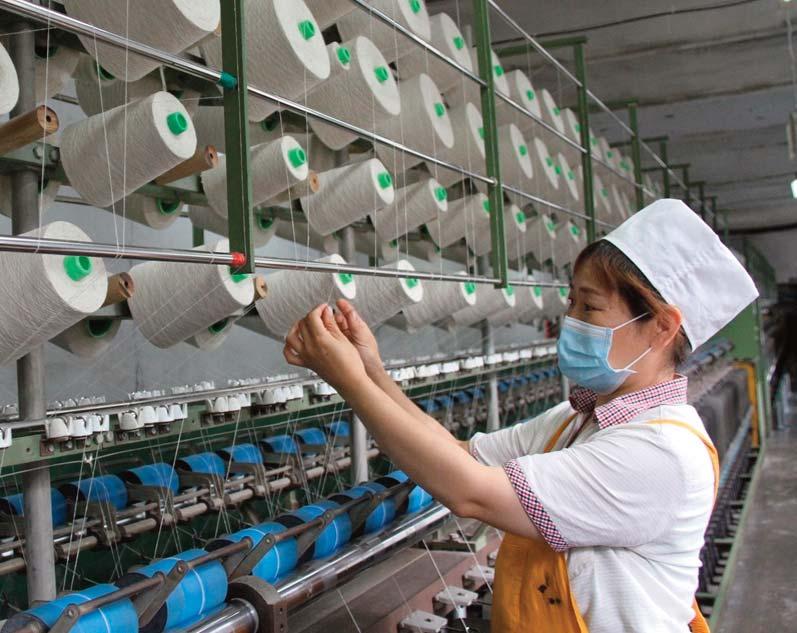
The tExtended project is spearheaded by the state-owned VTT Technical Research Centre of Finland. It intends to integrate recycling, waste valorization and data technologies and bring the current textile recycling from 1% to 80%, resolving an issue that’s been a challenge for a circular economy.
The project is supported by a Euro 15 Million (USD 16 Million) grant from the European Commission’s Horizon Europe program, with a total of 20 organizations from ten EU nations working together to create economically feasible and sustainable solutions to reduce waste in the textile field.

The four-year program intends to decrease textile waste, CO2 emissions, new job possibilities and develop a sustainable textile recycling industry.
Pirjo Heikkilä, project coordinator of VTT Technical Research Centre said: “The tExtended project will optimize textile flows and retain the value of materials in a safe and sustainable way. Through our extensive pilot studies, we will verify the repeatability of the tExtended solutions and their potential to reduce textile waste by 80%.”
With the help of digital tools, sensing systems, and data-driven solutions, tExtended aims to create and demonstrate efficient textile recovery, and waste valorization recycling processes.
Around the World
US cotton consumption in decline worldwide
Cotton consumption forecast is down more than 500,000 bales from the previous month due to lower consumption in Pakistan, Turkey, Bangladesh, and Indonesia due to an array of country-specific factors.

Both Pakistan and Bangladesh are experiencing issues opening and executing letters of credit along with declining profit margins amidst higher electricity costs. Turkey’s earthquake adversely affected mills in the area and Indonesia imports are forecast at the lowest level since 1990.
Global trade is forecast down roughly 800,000 bales from the previous month to 39.6 million bales, the lowest level in 6 years. This month’s adjustments are mostly attributed to lower global consumption.
Global ending stocks are forecast up more than 2.0 million bales to 91.1 million and mostly attributed to changes in China. China’s beginning and ending stocks were revised higher because of a downward revision to consumption in 2021/22 and higher 2022/23 production.
The U.S. balance sheet is unchanged from last month, and the projected U.S. season-average farm price is also unchanged at 83 cents per pound.
TURKIYE

Textile industry suffers as disasters hit hard
Turkiye has been rattled by the strongest earthquake in the history of the country since last century. The devastated nation suffered more than 20,000 deaths, a shattering impact on the country’s economy and a killer blow to country’s GDP.
Turkiye is one of the world’s major textile and apparel production and sourcing destinations, and the second largest source of textile and apparel exports to European Union countries. Turkiye’s textile and apparel exports in 2022 were valued at $35.25 billion. Turkiye has strong competitiveness in the global market in the apparel and home textiles segment. The Turkish clothing industry is the sixth largest supplier in the world with a share of 3.7%.
Turkiye has been a crucial sourcing destination for brands and retailers that represent the entire value chain of the textile and apparel industry. Since the earthquake has severely damaged production and logistics in Turkiye in many ways, manufacturers may look towards other countries for imports.
50% of total textile and apparel exports go to the EU countries. In 2022, it exported $20.64 billion worth of textiles and apparel to the EU, almost 25.60% up from $16.44 billion in 2020.
VIETNAM
Textile and garment exports statistics
According to the report of Vietnam’s export General Department of Customs two-way trade in February was up almost US$3 billion over January despite February being a slightly shorter month.

All-in-all Vietnam clocked-up over 46 Billion USD in two-way trade for the month with foreign direct invested enterprises accounting for a little over two-thirds.
The report mentioned that in the month of February Vietnam’s textile and garment exports grew by 1.94% (43.61 Million USD). Vietnam exported 2.29 Billion USD worth of textile and garments which is more than 2.25 Billion USD last month.
Moreover, Vietnam’s Textile industry for leather and foot-wear materials and auxiliaries showed a drastic growth of 35.41% (42.89 Million USD) with 164.047 Million USD worth of exports in February compared to 121.150 Million USD for the month of January.
The majority of these exports were destined to different Asian countries like China, Korea and Japan and a noticeable amount of textile were imported by the USA as well. Vietnam continues to be a major source of textile and garments in the challenging global markets and changing consumer preferences.

USA
16 PAKISTAN TEXTILE JOURNAL - March 2023
Around the World

Unique product created with Swedish innovation
Digitalisation and highly automated new technologies are enabling companies in high wage countries to competitively thrive in textile markets that for many years have been closed to them.
Just as significantly, these technologies are providing the tools to differentiate in highly competitive fields, as is demonstrated by a recent project initiated by TMAS – the Swedish Textile Machinery Association – for the highly automated production and decoration of a unique tote bag.

Plastic reduction
Back in 2015, the European Parliament reinforced legislation to encourage an 80% reduction in the use of conventional single-use plastic carrier bags by 2025.
The initiative immediately had broad public support, effectively encouraging a basic and widespread change in consumer behaviour. As a result, the consumption of disposable plastic bags has fallen significantly, along with a corresponding reduction in the waste they create.
There has also been a swing towards durable woven shopping bags which in the past have been labour-intensive to produce cheaply, as a result of the cutting and sewing involved.
Fully automatic
TMAS member Automatex has developed a fully automatic tote/consumer bag sewing unit which
can produce fully finished bags in heights of between 35-80 cm and widths of 3080 cm. The machine is configured to carry out all the necessary automated operations including hemming, handle insertion, cutting, labelling, bag forming and gusset forming, which previously had to be carried out manually.
Its output is some 540 units an hour, introducing a completely new cost paradigm.
The resulting bags, however, are still plain and uniform at this point, and with products that are intended to be used for as long as possible, personalisation is the key. Unique designs work to ensure purchasers are likely to become more attached to their products – and are happy to pay a little more for them in the first place.
Instant colouration
In order to add that another TMAS member company, Coloreel, became involved in the project.
Coloreel continues to secure multiple orders for its instant thread dyeing technology for high-speed decoration and embroidery – notably with the fastrising new generation of online merchandisers and brands for whom mass customisation and produce-ondemand sales are the key. The addition of a distinctive embroidered design to the tote bag using Coloreel’s technology took the product to a new level of attractiveness, as a further showcase for Swedish innovation.
The technology enables the highquality and instant dyeing of a textile thread while it is actually being used in embroidery production. It can be used with any existing embroidery machine without modifications. Additionally, this technology makes it
possible to produce gradients in an embroidery design, as demonstrated by the TMAS logo and the text in the image.
Advanced rapid colour formulation software and high-speed drive technology allow a single needle to carry out what it previously required many multiples of them to do – and with much more consistent stitch quality.
By instantly dyeing a recycled white thread during production, the system enables complete freedom to create unique decorations and embroideries without any limitations. Colour changes along the thread can either be made rapidly from one solid colour to another, or gradually, to make smooth transitions or any colouring effect desired.
This provides big benefits when it comes to both sustainability and design creativity.
Potential of Swedish innovation
“Coloreel’s designs on the batch of bags produced on the Automatex machine are truly outstanding and have been turning heads wherever they appear,” says TMAS secretary general Therese Premler-Andersson. “The collaboration really emphasizes the positive potential of the latest Swedish digital textile technologies which are enabling companies to generate new revenue streams wherever they happen to be located.”

18 PAKISTAN TEXTILE JOURNAL - March 2023 Corporate News
U.S. Cotton Trust Protocol has tracked over 3 million kilograms of cotton

The U.S. Cotton Trust Protocol (Trust Protocol) announced that it has now reached a critical milestone of tracking over 3 million kilograms of cotton through its proprietary Protocol Consumption Management Solution (PCMS).

This significant milestone was hit during the busiest fashion month - when all eyes are on the industry and the spotlight on its sustainability during the biennial fashion month which opened on February 9 with the New York Fashion Week and closes Paris Fashion Week on March 7.
As international brands and retailers seek to credibly and transparently demonstrate their own efforts and achievements in driving sustainability in the industry, the Trust Protocol’s announcement marks a significant achievement in its development since its inception in 2020.
The verified data released recently also shows that a total of more than 11 million units of finished products have been tracked through the PCMS system.
“Coming in the middle of the world fashion month, these figures are not only timely, but outstanding in terms of the progress that the U.S. Cotton Trust Protocol has achieved in the three short years since its inception”, said Dr. Gary Adams, President of the U.S. Cotton Trust
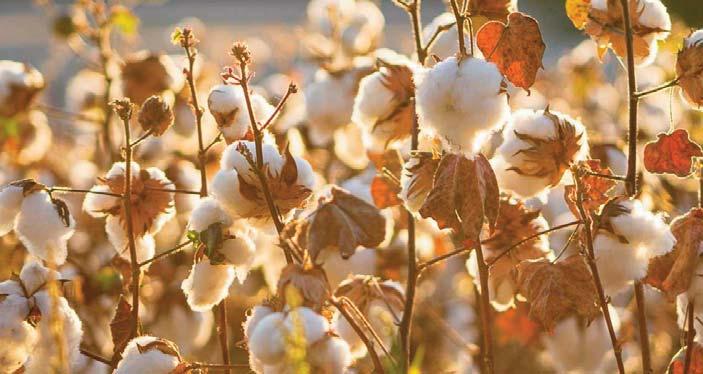
Protocol. “Using the PCMS, brand and retailer members can make a variety of claims, including on-product, that are based on data-backed, verified Protocol Consumption Units.”
“Providing transparency through the supply chain is one of the Trust Protocol’s core premises and we’re proud to be the world’s first sustainable cotton fiber program to offer its members article-level transparency”, he added.

This is possible because the PCMS leverages blockchain and other digital technologies to record and verify the movement of Protocol Cotton and U.S. Cotton at every stage of the supply chain in near real time. This requires all members of the supply chain – including

mills and manufacturers – to be a member of the Trust Protocol.
The Trust Protocol is also the only system that provides quantifiable, verifiable goals and measurement and drives continuous improvement in six key sustainability metrics: land use; soil carbon; water management; soil loss; greenhouse gas emissions, and energy efficiency.
The program captures key environmental and social data under a farm-level, science-based system and reports these annually on an aggregated basis.
To learn more about The Trust Protocol, visit TrustUSCotton.org.
19 Features
Critical milestone hit during busiest month for fashion industry when spotlight is on sustainability. Over 11m finished articles tracked through Protocol Consumption Management Solution (PCMS)
Groz-Beckert’s WarpMasterPlus –successful presentation in Asia
The latest generation of Groz-Beckert's fully automatic drawing-in machine –the WarpMasterPlus – was presented live on site for the first time in Asia during ITME INDIA exhibition. In addition, Groz-Beckert presented its knotting machine KnotMaster.
With the new WarpMasterPlus, GrozBeckert relied on the globally proven drawing-in concept, where the drawingin takes place via a single yarn package technology. Nevertheless, WarpMasterPlus is not simply a further development of the previous generation of machines: The system has been newly constructed from the scratch. The latest technologies were consistently used to bring a machine to the market that is already equipped today for future requirements with regard to increased automation in the course of Industry 4.0.
Maximum flexibility with minimum setup time were further focal points in the development, as well as maximized machine efficiency and simultaneously reduce the loading and unloading time. For this purpose, the number of cycles has been increased and sophisticated functions such as pre-setting drop wire magazines and CNC axes for adjusting the heald length have been added. Conversion times can be reduced to a minimum with different accessories.
Numerous visitors took the chance to experience one of the WarpMasterPlus demonstrations at the ITME. All those who were unable to attend a demonstration at ITME will have the opportunity to experience the WarpMasterPlus at the recently inaugurated showroom in Ichalkaranji in Kolhapur District of Maharashtra State in future. Among other things, Groz-Beckert offers individual customer trials and trainings on the machine here.
Other machines from the GrozBeckert’s Weaving Division portfolio are available for training, tests and demonstrations at the showroom too such as the KnotMaster. Tens of thousands of KnotMaster tying machines are successfully deployed worldwide.

Sophisticated technology and simple operation for a wide range of applications are considered the big advantages of the KnotMaster series. Customers benefit from rapid warp changes and reduced processing times for a more efficient and cost-effective weaving preparation. Regarding efficiency, the KnotMaster impresses with its high-performance achieving up to 600 knots per minute.
Intelligent technical features of the KnotMaster increase both process reliability and reproducibility. The yarn clamps with a separate clamping system for example: These special KnotMaster yarn clamps allow the clamping of different yarn thicknesses. Differences in thickness are automatically compensated. Thanks to the automatic repeater, the KnotMaster ensures highest process reliability. In case the separation unit cannot select a yarn on the first attempt, the control repeats the attempt by a predefined number of times. This happens at the full speed of the tying process.
WarpMasterPlus and the KnotMaster are the winning combination for weavers and the flagships of Groz-Beckert’s weaving preparation portfolio. The machines are characterized by their simple operation and great flexibility. Groz-Beckert is convinced that the machines with showing these advantages will improve quality and profitability in worldwide weaving mills in future.

Features 20 PAKISTAN TEXTILE JOURNAL - March 2023
Groz-Beckert WarpMasterPlus.
Groz-Beckert Weaving KnotMaster
The LYCRA Company announces latest Higg achievements
Multiple Sites Earn Independent Verification Results in Top Quartile
The LYCRA Company, a global leader in developing innovative fiber and technology solutions for the apparel and personal care industries, announced that several of its manufacturing sites had their Higg Facility Environmental Module (Higg FEM) and Higg Facility Social & Labor Module (Higg FSLM) selfassessments verified by an independent third party last year and achieved scores in the top quartile.
The LYCRA Company’s manufacturing sites in Waynesboro, Virginia; Maydown, Northern Ireland; and Foshan, China, completed verification for the Higg FEM module, while its Tuas, Singapore, and Maydown sites completed verification for the Higg FSLM module.. A copy of the verified reports for Higg FEM and Higg FSLM can be requested at communications@lycra.com.
Higg FEM reviews air emissions, energy use, environmental management systems, wastewater, waste, chemical management and water usage. The LYCRA Company’s six manufacturing sites have completed the selfassessment, with the three sites mentioned above securing verification. The company’s goal is to have sites representing 80% of LYCRA® fiber production to be Higg FEM verified by 2024.
“The LYCRA Company strives to be an industry leader for sustainability by utilizing credible and independently verified data,” said Alan McElreavey, operations sustainability program manager at The LYCRA Company. “The Higg Facilities modules are widely used within the apparel industry to assess the environmental impact of manufacturing facilities, to uncover opportunities for improvement, and to measure our progress against established baseline performance. Completing the Higg facility modules drives behaviors that become embedded in our company, enhancing our sustainability culture and creating measurable change.”
“Higg FEM is aligned with our goals in key impact areas and helps us improve our sustainability profile and operate as a good corporate citizen,” said Hector Chapa, business integration manager at The LYCRA Company. “It also supports two pillars of our Planet Agenda sustainability platform - corporate responsibility and manufacturing excellence.”
The LYCRA Company’s Tuas, Singapore and Maydown, Northern Ireland manufacturing sites also completed third-party

verification of their Higg FSLM, both with scores in the top quartile. The Higg FSLM self-assessment provides insights into social progress and labor conditions at each site, including compensation and health and safety, and identifies areas for continuous improvement.
“Our upstream and downstream customers are increasingly asking suppliers like us to provide independent certifications that assess the environmental impact of their facilities, as well as social and labor practices in the workplace,” said Kok Beng Chew, Asia Pacific Regional Operations Director. “The Higg Facility Tools are a must-have for business today because they enable us to stay on track and be a responsible Spandex producer.”
The LYCRA Company is a member of the Sustainable Apparel Coalition, a nonprofit alliance that developed the Higg Facility Tools. The global organization consists of over 280 stakeholders in the fashion industry.
To learn more about Higg assessments completed by The LYCRA Company, visit below: lycra.com/sustainability.
Features 21
The LYCRA Company’s manufacturing sites in Waynesboro, Virginia; Maydown, Northern Ireland; and Foshan, China, completed verification for the Higg FEM module, while its Tuas, Singapore, and Maydown sites completed verification for the Higg FSLM module.
FESPA Global Print Expo 2023 set to welcome strong line-up of 490 international exhibitors
More than 490 exhibiting companies are already confirmed to participate at FESPA Global Print Expo, European Sign Expo and Personalisation
Experience 2023, including 95 suppliers who were unable to attend the events in the last two years due to travel restrictions.
Exhibiting companies include DP Solutions, eurolaser, INX, Lüscher Technologies, Marabu, SPS TechnoScreen, Vastex International and Vivid Laminating Technologies. The lineup also features 78 new exhibitors, including Aerolam Decoratives, CarbonQuota, Duveholm Stallbacken, Magon, Newtown Packaging, Ronchini Massimo, Scandinavian Print Group, Toscana Systems and XEIKON.
Visitors to FESPA Global Print Expo 2023 will see solutions from event sponsors Durst, Surfex, Brother, Mimaki, Hanglory and HP and hardware from

leading suppliers including AGFA, Aeoon, Aleph, Canon, Epson, Fujifilm, HP, Kongsberg, Liyu, MHM, Sakurai, Swissqprint, Ricoh, Roland, ROQ and Zünd.
Confirmed automation and workflow software suppliers include Caldera, efi, Enfocus BV, OneVision and PrintFactory. Ahlstrom Munksjö, APA, Hexis, ImagePerfect/Berger Textiles, InkTec, Neschen, ORAFOL, Poli-Tape and Sun Chemical are also among the companies presenting media and consumables.
Head of FESPA Global Print Expo, Michael Ryan comments: “Exhibitors who haven’t been able to participate in FESPA events in the last few years can’t wait to share their innovations and expertise with our visitors. And we know that printers benefit hugely from being able to see products from many suppliers in one place, helping them to compare and evaluate the right investments for their
business. Our mission this year is to give valuable new perspectives to printers and signmakers. With the strongest line-up of FESPA exhibitors since 2019, we can guarantee that visitors to Munich in May will be in the best place to get the insight and advice they need to overcome their production challenges, access new opportunities and imagine their business future.”
Christoph Gamper, CEO & CoOwner, Durst comments: “Whereas there was a strong focus on faster production in recent years, digital printing is now no longer the new kid on the block. The emphasis is now on automation, efficiency, and an overall sustainable process in the various digital printing applications. We are pleased to have FESPA in our ‘neighbourhood’ this year and look forward to a lively exchange of applications and unique views, celebrating achievements and discussing
22 PAKISTAN TEXTILE JOURNAL - March 2023 Faris and Exhibitions
new perspectives. The best ideas are born in dialogue, and FESPA offers the ideal setting.”
European Sign Expo 2023, the leading European exhibition for signage and visual communications, will be co-located with FESPA Global Print Expo. With the support of Platinum Sponsor EFKA, the event will reunite key signage professionals with companies specialising in channel lettering, digital signage, dimensional signage, engraving and
etching, illuminated displays, out of home media, LED, outdoor systems, laser cutters and sign tools.
The brand new Personalisation Experience will give visitors the opportunity to learn more about personalisation, with specialist suppliers including Antigro, Brother, Dreamscape, Infigo, Optimus, Printbox, Print & Logistics, Taopix and XMPie showcasing products and solutions.

Registration for FESPA Global Print Expo, European Sign Expo and Personalisation Experience is now live. Entry to all three exhibition areas is free for members of a FESPA national Association or FESPA Direct. A four-day pass for the Personalisation Experience conference area will be priced at €495. Tickets to the PE conference are €225 for visitors who register before March 23rd using code PEX1.

and Exhibitions 23
Fairs
Why ITMA is the greatest show on earth?
Cornelia Buchwalder, Secretary General of the Swiss Textile Machinery Association

In the world of textile manufacturing, ITMA is really the ‘greatest show on earth.’ It’s where the progress of textile and clothing technology is measured and benchmarked against previous years, and vital contacts are made between customers and suppliers worldwide. Swiss companies are renowned for their innovative spirit and commitment to the four-yearly exhibition series. Looking ahead to ITMA 2023 in Milan (June 814), this interview with Cornelia Buchwalder, Secretary General of the Swiss Textile Machinery Association explores the real importance of ITMA as a driver of global textile progress.
How important is ITMA 2023 for Swiss Textile Machinery member companies?
Not only for us, but for the visitors from the textile manufacturers, ITMA is vitally important, and a major element in the overall development of the industry worldwide.
The 2023 ITMA is fully booked – clear evidence of its continued appeal as the essential marked place for textile machinery. And its importance is underlined by the participation of more than 50 Swiss exhibitors, most of which are members of the Textile Machinery Association. We will be there in Milan, because we know it’s the perfect opportunity to show the world what we offer.
Our Association is a major player in textiles. Established in 1940, it now includes 44 member firms, covering the entire textile value chain. Together, these companies have a total of more than 4,000 years of experience, and an unrivalled international reputation for innovation and quality.
Is ITMA really still a focus for the timing of major innovations in technology?
That is certainly the way the ITMA shows have been viewed in the past. Today it’s not the only forum for innovation, which is now more of an ongoing process of collaborative effort between machinery companies and their customers. But ITMA remains a fouryearly milestone in technology, where industry visitors rightly expect to see the best and latest ideas from their suppliers. It’s increasingly interesting to evaluate how innovations fit into the wider textile value chain, rather than in a company’s own specialized branch of the sector.
Obviously, Swiss Textile Machinery companies will want to use this big event to grow their business and expand sales. Are there other motivations for exhibiting at ITMA 2023?
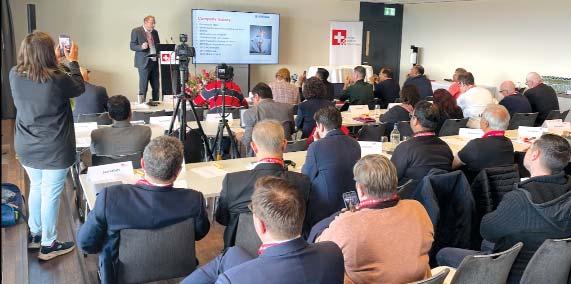

Yes, that’s a primary goal for sure. But we don’t underestimate the superb networking opportunities it will bring, fostering shared knowledge and experience with both new and existing partners.
Significantly, 2023 will be one of the first really major shows for textiles since the coronavirus pandemic put a stop to personal business interactions. It will be great to enjoy face-to-face meetings again this time. We have a lot to talk about!
For our member firms, it’s also a chance to focus on how our products, components and services stack up against competitors’ offerings, and gauge the reaction from visitors to our booths.
24 PAKISTAN TEXTILE JOURNAL - March 2023
Swiss Review
What
actual innovations and novelties can we expect in Milan?
We will certainly be ready with a strong display of new Swiss developments, as each company presents its latest innovations. For the specifics, individual members companies will be delighted to provide more detailed information – and maybe even some surprises at the show itself.
What would the Swiss Textile Machinery Association aim to achieve at ITMA?

One of our key goals would be to assure visitors that Switzerland is seen in the vanguard of progress in both sophisticated digital solutions and sustainable solutions. Sustainability has a double meaning for us: the ability to offer continuing benefits and enduring performance for our customers, while embracing every aspect of sustainable production to the highest standards of environmental responsibility.


We achieve these standards through significant investments in R&D – a major slice of revenue for most of our members – and by close cooperation with experts in the leading products, components and services. ‘Innovation is in our DNA’ is more than a slogan: we have the history of achievements to prove it.
What is it that makes Swiss machinery so special?
Of course, there are respected textile machinery suppliers in other countries too! Switzerland though has the reputation, earned over many decades, of the highest levels of excellence and precision in all aspects of manufacturing and engineering. Textile machines, components and services rightly share that status. Our in-house production systems are cutting-edge and sustainable.
Customers say it for us: With Swiss companies, quality is guaranteed. Why should textile industry visitors go to ITMA 2023?
Couldn’t they just stay at home and get the info they need online? Well, maybe, but there is nothing quite like seeing a new machine or an exciting innovation up and running in the bustling halls of a major show. Live demonstrations at timed intervals are often crowded with eager visitors – for a good reason. It’s the way to be inspired, and find solutions that could literally change your business outlook, and actually grow your profits.
ITMA 2023 will also give visitors a chance to speak personally with the

experts from machinery companies, to ask those ‘difficult’ questions and get the full story behind a vital innovation. How will it fit into an existing production environment, will it help to reduce waste, will it help to improve profitability…?
Then there are the big questions, about investment costs and funding. Big deals are started at ITMA, and contracts are often finalized – admittedly sometimes as a publicity boost. Visitors can also compare offers from different providers. Obviously, we hope the choice is for the Swiss option! Ultimately, ITMA is a celebration of the achievements of the global textile community, and an opportunity to foster the kind of innovative developments that future generations will be proud of.
Swiss Review 25
SSM offers sustainable and energy efficient processes
SSM embodies sustainability by offering energy efficient technologies and processes to reduce energy consumption and lower carbon footprint. SSM promotes the concept of upgrading and retrofitting existing products and flexible machine concepts, serving maximum amount of applications.
The latest products and services at ITMA Milano 2023 include NEO-FW, NEO-FD and Nema – SSM Digital Suite.
SSM NEO-FW
The SSM NEO-FW precision package winder is set to make its worldwide market introduction at ITMA Milano 2023. This new product offers outstanding advantages, which include: Automatic doffer, which helps to reduce downtime. The NEO-FW is capable of winding at higher speeds than previous models, resulting in a 25% increase in productivity.
The NEO-FW features the most accurate length measuring system available, with a precision of ± 0.5%. This ensures that all packages are of consistent length, resulting in higher quality yarn.
Quick take-up change allows for fast and easy changeovers between different package types. Other advantages include: Digitens – yarn tension control and
Fastflex – electronic yarn laying unit. The NEO-FW is Nema ready, which means it can be integrated with the Nema-SSM Digital Suite, enabling manufacturers to digitize and optimize their production processes.

SSM NEO-FD
SSM NEO-FD precision assembly winder offers following advantages: Automatic doffer – maximizing productivity.
Increased speed by 25%.
Accurate length measuring (± 0.5%). Quick take-up change. digitens – yarn tension control. fastflex – electronic yarn laying unit. Integrated 2- or 3-ply creel. Nema ready.
Nema (IoT) solution for controlling and managing production (optimization means less energy consumption, less waste and increased machine efficiency).
Real-time insights provide transparency of the process performance
Stay in control easily – navigating from global overview to local insights within seconds
Engage key people with unlimited user access.
Ensure optimized machine operation with machine health indicators. Enjoy secure connection and safe data storage with state-of-the-art technology.
Connect to other MES or ERP systems with download event function. Nema, the Digital Suite of SSM, helps SSM customers navigate through complexity, uncover hidden issues and find the path to manufacturing excellence.
Three Dedicated Card Clothing Packages by Graf
Graf is considered as one of the market leaders in providing specialized solutions for the recycling of various fibers in the textile industry.

At the upcoming ITMA in Milan Graf shall present three dedicated Card Clothing Packages for recycled cotton, recycled cotton blends, and last, but not the least recycled man-made fibers (MMF). These three solutions allow for the production of yarn counts up to Ne 20 by limiting the short fiber content.
Additionally, Graf offers the option to customize more specific Card Clothing sets for all kinds of recycling applications with the help of their textile technology experts.

Swiss Review 26 PAKISTAN TEXTILE JOURNAL - March 2023
Nema – SSM digital suite
SSM NEO-FW precision package winder.
Per Olofsson, Managing Director, SSM.
Rieter: Mastering the Short Fiber Challenge
Rieter Machines and Systems Head
Marketing and Systems Franziska
Häfeli gave a presentation on Rieter’s strong position in the short fibre field and the increasing demand for recycled yarns. Following are the salient points of the presentation.

Recycling Industry Today
A significant growth potential
Nearly three quarters of all garments end up in landfills.
Out of the 89 million tones annual fiber production, only 1% is recycled from pre- or post-consumer textiles. The recycling potential is estimated to be more than 15%.
EU Strategy for Sustainable and Circular Textiles with ambitious goals.
Two Ways to Open Fibers
Chemical recycling and mechanical recycling are two ways to open fibers in textile recycling. The chemical recycling involves breaking down fibers into chemical building blocks, which can then be used to create new products. This process is particularly useful for cotton waste and blended waste, where separating fibers through mechanical means is challenging.
On the other hand, mechanical recycling involves tearing pre- and postconsumer goods into pieces and then torn by cylinders into fibers. This method has its roots in the downcycling business and is a more aggressive way of opening fibers. The main advantage of mechanical recycling is that it is a well-established and cost-effective process. However, the downside is that it can lead to a loss of quality and the resulting fibers are typically of lower quality than the original fibers.
In contrast, chemical recycling has the potential to create high-quality fibers that are equivalent to or even better than the original fibers. However, the process is currently more expensive and requires more research and development to become a viable commercial option. Overall, both chemical and mechanical
recycling have their advantages and limitations. The choice of method depends on the type of fiber being recycled, the desired quality of the resulting fibers, and the cost-effectiveness of the process.
Recycled Yarns
The typical spinning processes for Short Fibers include rotor and ring spinning system for recycling. It is important to note that both rotor and ring spinning have their advantages and limitations, and the choice of method depends on several factors, including the type of fiber being used, the desired quality of the resulting yarn, and the cost-effectiveness of the process.
In textile recycling, both rotor and ring spinning can be used to create new yarn from recycled fibers, reducing the amount of waste generated by the textile industry and promoting a more sustainable approach to manufacturing textiles.

Rieter Rotor spinning system for recycling
Spinners have been using the rotor spinning process for decades for recycled material.
Many did not even claim to use recycled material save raw material cost. Rotor spinning is best suited for processing material with a high shortfiber content.
Rieter Ring spinning system for recycling
Increasing demand also for recycled ring yarns (wider application range).
Higher tenacity of ring yarn go into weaving.
Different, softer touch, finer counts.
Possibility for core yarn (stretch) on the end spinning machine, but very challenging due to neps and high short fiber content.
Rieter is collaborating with a topquality denim manufacturer to test adaptations along the value chain. Denim Ne 7-12 with 80/20% virgin cotton/post-consumer (bleached) was used in the sample yarn. The progress with the sample yarns using the Rieter ring spinning system, shows improved yarn quality (reduced IPIs, lower shortfiber content), achieved through settings on card, draw frame, roving, and compact-spinning settings. The target of using a 50% share of recycling materials is ambitious , but trials and improvements continue to yield positive results along the entire spinning process.
Com4 recycling for Recycled Yarns
Com4® is a registered trademark by Rieter, and it is used for quality yarns spun on Rieter spinning systems and apparel made out of these yarns. Customers can participate in the Com4® licensee program. This program allows customers to use the Com4® trademark on their products, indicating that they are made from high-quality yarns spun on Rieter spinning systems.
27
Swiss Review
Franziska Häfeli, Head Marketing & Systems Rieter Machines and Systems.
The Design of a Circular Ecosystem
Brigitt Egloff, Researcher and Designer at Lucerne University of Applied Sciences and Arts and Franziska Häfeli, Head Marketing & Systems Rieter Machines and Systems explained the collaborative project TexCircle that is contributing towards the design of a circular economy.

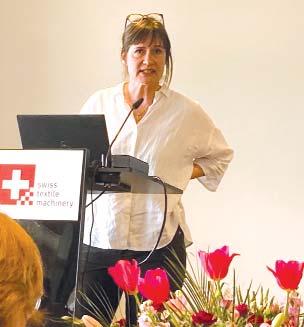
Climate change and environmental degradation are some of the main concerns facing us today. With barely 1% of garments being recycled and three quarters of the world’s clothing ending up in landfill, the textile industry is actively seeking ways to make production
patterns more sustainable and pay more attention to the entire life cycle of items of clothing. Rieter is actively committed to a sustainable policy, using its technological expertise to offer a complete recycling spinning system for both ring and rotor spinning lines that enables customers to spin fibers from used garments and waste into yarns.
“TexCircle” cluster, consists of Swiss and international companies in the field of textile manufacturing and textile recycling. The project partners joined forces by contributing their know-how, areas of expertise, funding and materials. Contributors include Rieter, Coop, Rohner Socks, Ruckstuhl, Texaid and Workfashion. Other network partners include the Federal Office of Civilian Service (ZIVI), Nikin and Tiger Liz Textiles. The project has received additional support through collaborations with Swiss firms such as Jakob Härdi AG and international companies such as Marchi & Fildi. It is being funded by the Swiss Innovation agency Innosuisse.

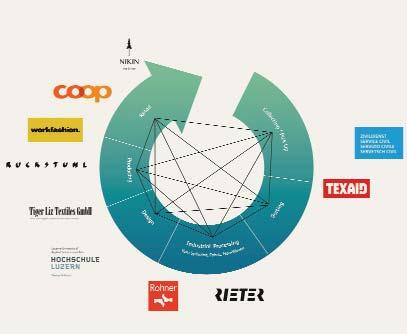
By creating and testing prototypes, the project examined various circular value-added scenarios. The focus was on making the challenges of a future circular economy verifiable rather than developing prototypes as precursors to marketable products. Based on an inventory of material, 2.5 tonnes of textiles were collected in the cluster and developed into six prototypes over the two years.
Brigitt Egloff and Franziska Häfeli, showed the socks and other prototypes by Texcircle at the end of their presentations.

Swiss Review 28 PAKISTAN TEXTILE JOURNAL - March 2023
Brigitt Egloff, Researcher and Designer at Lucerne University of Applied Sciences and Arts
Itema Group offers advanced weaving solutions

Itema, the global leading provider of advanced weaving solutions, including weaving machines, OEM spare parts, weaving accessories, and integrated services, participated in the Swissmem pre-ITMA 2023 press conference in Bern on the 17th of March.
Matteo Mutti, Itema Switzerland Ltd Managing Director, first introduced the Group’s 2022 financial results and then focused on ITMA 2023.

In 2022, Itema recorded a sales revenue of EUR 337.6 million, up +10% over the previous year, thus continuing its path of constant growth.
Mr. Mutti continued by introducing the main highlights of the Itema Group’s participation in the upcoming ITMA 2023: “ITMA 2023 will take place in Milan, Italy, which is our Group home country. Therefore, we are excited to welcome visitors from all over the world and we are working to guarantee to them the best possible experience at the event.”
Itema is present at ITMA 2023 with the target to be a meeting point for the industry. The Itema Group booth in Hall 6 - B105 will offer all the latest innovations in the Itema weaving technology and also premium weaving accessories by the Group companies Lamiflex and Schoch to make the weaving process even more effective, sustainable, smart, and successful.
In Mr. Mutti’s words: “At ITMA, Itema will present a full range of solutions developed to make our customers’ life easier while providing them with tangible benefits in terms of textile mastery, ecoefficiency, digitalization and easy weaving.”
Itema is a leading global provider of advanced weaving solutions, including best-in-class weaving machines, spare parts and integrated services. Sixty per cent of Itema is held by Gianni Radici’s family heirs (the siblings Angelo, Maurizio, Paolo, Maria Grazia and Bruna) and 40% by the Arizzi and Torri families.
Itema Group business areas include also industrial and innovation. In fact, in recent years the Group diversified into complementary, high-growth markets through stakes in innovation driven companies, such as Lamiflex®, Schoch® and Itemalab®, the Itema advanced innovation hub created in 2014 that in 2021 evolved into a fully-fledged company dedicated to develop breakthrough textile and industrial
solutions. With more than 1.000 employees worldwide, world-class production sites in Italy, Switzerland, China and India (the latter for Schoch products, ndr), Itema features a global presence with commercial and after-sales services in Italy, Switzerland, China, India, Japan, USA, Hong Kong, Dubai, and Türkiye. More information about Itema can be found on the website www.itemagroup.com.
Matteo Mutti, Managing Director, Itema Switzerland Ltd.
Swiss Review 29
R9500 is ideal for various textile applications, such as shirting, wool, silk, furnishing, curtains, home textile, apparel and technical fabrics.
Sustainability at forefront with innovative solutions by Autefa
Autefa Solutions is one of the leading global suppliers of innovative and highperformance machines and systems. The company will be showcasing its latest developments at ITMA 2023, which runs from June 7-14.


The company operates in four main business areas: Nonwovens Technology, Baling Technology, Woollen/Worsted Technology, and Automation Technology.
Autefa's technology includes cardedcrosslapped needle punch lines, aero-dynamic web forming technology, thermo-bonding lines, and spunlace lines. As one of the market leaders in staple fiber and tow baling presses, the company offers everything from fiber transport to the baler to bale handling and storage. Autefa also offers OCTIR woollen carding sets for high-quality weaving and knitting yarns.
At ITMA 2023, Autefa will showcase its expertise in advanced materials, digital future, innovative technologies, and sustainability. The company's advanced Airlay technology delivers heavy and thick fibers mats by using natural or recycled fiber for the growing acoustic and thermal insulation market. The energy-saving Spunlace technology is designed to maximize efficiency while minimizing energy consumption. Lastly, the Needle Exchanger technology reduces downtime and increases productivity, making it a valuable addition to any production line.
Autefa Solutions offers a range of innovative solutions designed to process and reuse various types of fibers, including reclaimed, natural, and manmade materials. The Airlay KV12/K12 aerodynamic web forming machine in combination with Stylus Needle Loom or HiPerTherm Oven meets customer requirements for productivity and high quality.
The Needle Exchanger is an innovative solution to address the challenges of re-needling needle boards in needle punching nonwovens production.
30 PAKISTAN TEXTILE JOURNAL - March 2023
André Imhof, CEO, AUTEFA Solutions Switzerland and AUTEFA Solutions Austria.
AUTEFA Solutions Airlay Futura.
The machine replaces the physically tiring and risky manual process of needle insertion, exchange, and removal with an automated process that removes the risk of operator injury and minimizes the risk of board damage. The Automatic Needle Exchanger is equipped with adapted software to ensure reproducibility and safety at every needle exchange.
Autefa Solutions has also cooperated with PAMA Paper Machinery to offer Wetlaid-Spunlace technology, a process that combines fiber-based web forming, consolidation, and drying technology with the Wetlaid technology commonly used in the paper industry. The process improves the bulkiness and feel of the final product through Autefa carding and spunlace technology. Compared to the classic Wetlaid inclined wire technology, Autefa Solutions is focusing on innovative paper machine solutions with even better
performance, especially for CP products. The use of this technology reduces the amount of pulp fibers and energy required.
Further savings in power and water consumption are achieved with Autefa Solutions' V-Jet technology for hydroentanglement, effective dewatering with V-shaped suction slots, and the efficient SQ-V square drum dryer technology. This technology is designed to create a uniform pulp layer for optimal fiber distribution with the lowest fiber consumption.
Autefa Solutions offers automated bale warehousing solutions that optimize space and streamline operations. During ITMA, the company will unveil one of the largest PET fiber bale logistics centers in the world. The warehouse and logistics center will organize, press, form, package, strap, identify, label, stack, sort
and prepare the enormous fiber output of six new polyester staple fiber lines with specific fiber know-how for storage and further logistical actions.
The company has become an expert in special fiber properties, offering fully automated baling systems with enormous capacities, covered and sealed short cut balers, hygienic fiber baling systems, silicon and conjugated fiber baling systems, bale transport with additional strapping, weighing, automated labeling, stacking, and sorting, and storage as a block or rack system.
Autefa Solutions' commitment to sustainability is reflected in its goal of reducing our carbon footprint. The innovations and technologies are designed to minimize waste and energy consumption, making them a sustainable choice for businesses looking to reduce their environmental impact.
Bluesign Technologies offers sustainable solution systems
Bluesign technologies is a full-service sustainability solution system for the fashion supply chain that specializes in responsible chemistry.
Through their on-site assessments they are providing unique solutions to improve environmental performance, working conditions (OH&S), and resource consumption that can improve the standards of people (workers), planet and consumers.
Mr. Daniel Rufenacht, CEO Bluesign Technologies who holds a vast experience has developed a new service portfolio which is all set to increase the horizons of Bluesign with exciting new partnerships in different market segments and geographies.
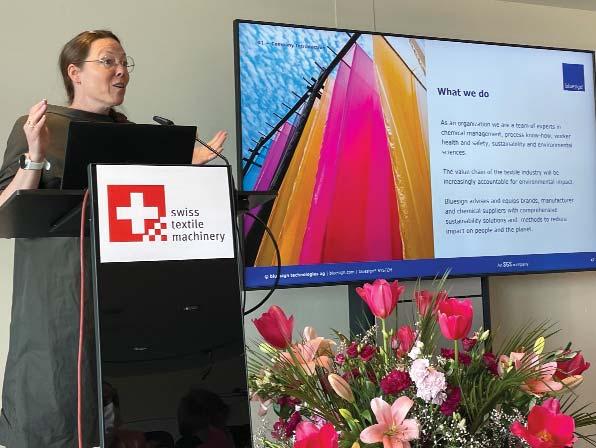
Unlike traditional organizations, Bluesign believes in developing a system built partnership with their SYSTEM PARTNERS, guiding them throughout the entire process at every level resulting in improved impact of chemicals on an ongoing basis.
This is the reason why Bluesign is considered as a Gold-Standard in chemical management, as to use any
Bluesign label all chemical suppliers, textile manufacturers and brands must be a Bluesign System Partner.
Instead of certifying the finished goods, certification happens as a natural progression of implementing the Bluesign system at textile manufacturers or chemical suppliers.
Bluesign currently offers three tiers of services namely; System partnership which provides access to all the tools, analyses, and expert support to envision and attain meaningful impact reduction and the right to use the Bluesign trademarks; Impact services which provides expanded capabilities that enables brands to actively monitor and manage their supply chain and take efficient decisions with the help of Bluesign Impact data; Data services which provides brands access to actively monitor and manage the Bluesign Impact data from their tier 2 suppliers and
continuously assess the environmental impact of their supply chain.
Bluesign, so far from IMPACT
RESULTS 2010 till 2020 states that an average Bluesign Partner mill, through research, data, dedication and strong mindset has managed to reduce 5% energy consumption, 18% water consumption, 17% chemical consumption, 12% carbon emissions every year, which has resulted in saving 4,500 MWh worth of energy, 170,000,000 L of water and reduction of 341 tons of chemicals usage and 3,500 tons of carbon emissions every year.
31
Swiss Review
Barbara Oswald Head of Assessment Textile and Accessories.
SANTEX RIMAR AG offers technology for textile finishing of
high-quality knitted fabrics
SANTEX RIMAR AG is one of the leaders in technology for textile finishing of high-quality knitted fabrics, offering comprehensive systems of stand-alone machines for the treatment of tubular and open knitted fabrics.
Santex' goal is to maximise performance with low energy consumption to achieve low residual shrinkage, smoother handle and silk-like appearance. The lines are equipped with various energy saving options, benefiting customers through sustainable production and low CO2 levels. Many of the world's renowned fashion houses rely on the expertise of SANTEX RIMAR AG, which was founded in Switzerland in 1982.
With SANTAFRAME and SANTACOMPACT RDA, SANTEX RIMAR AG presents its well-known stenter frame in combination with the felt belt compacting machine for the finishing of high-quality openwidth knitted fabrics as well as applicable for woven fabrics.
The outstanding performance and production of the SANTAFRAME is based on continual development using the latest advances in thermodynamics, allied to the changing need of customers.
The heating system is located above the fabric web in the upper part of the two meters treatment zone. An air circulation fan draws the air from the nozzles and the treatment zone through the filter panels and guides it along a short path to the heat exchanger, from where it is fed into the nozzles.
The arrangement of the heat source on the pressure side of the air circulation fan enables a high air circulation speed and uniform heat distribution over the entire fabric width, thus achieving an unrich drying performance. This technology results in high energy savings and cost reductions in the drying and heat-setting process of textile fabrics.

The Cavimelt Pro process is a sustainable solution for hotmelt adhesives, offering benefits that contribute to a more environmentally friendly and efficient production process. Some of the key sustainability features of the Cavimelt Pro process include: Rapid switching between rotogravure and fullsurface coating: With the quick-change application head, users can switch between different coating methods in just a few seconds, without the need for any tools. This enables them to cover a wider
range of applications and extend their customer base.
100 percent recyclability: The Cavimelt Pro process offers adhesives that are fully recyclable.
Water-free: The process does not require any water, which eliminates the need for evaporation and reduces the energy consumption associated with this process.
Solvent-free: The process does not use any solvents, which eliminates the need for an exhaust filter and reduces the environmental impact of the production process.
Dry process: The Cavimelt Pro process is a dry process, which means that there is no need for any drying or curing time, reducing the production time and energy consumption.
Low Isocyanate content: The process has a Isocyanate content of less than 0.1 percent, which reduces the potential health risks.
Low energy consumption: The process has a maximum energy consumption of 40-50 kWh, which helps to reduce the energy consumption and environmental impact of the production process.
The Cavimelt Pro process offers a sustainable solution for hotmelt adhesives that reduces waste, energy consumption, and environmental impact.
SANTEX RIMAR GROUP located at H18 Booth no. A110 is going to highlight Swiss and Italian innovative solutions based on the real need of the customer and for high productivity and sustainable production.

32 PAKISTAN TEXTILE JOURNAL - March 2023
Natascha Meier, SANTEX RIMAR GROUP.
Swiss Review
“SANTAFRAME design is based on continual developments using the latest advances in thermodynamics, allied to the changing need of customers,” says Natascha Meier, SANTEX RIMAR GROUP.
Heberlein: Expert for air interlacing and air texturing jets
Advanced Performance - New DTY Jet insert generation "AP" at ITMA Milano in Hall 3 - booth E204. Heberlein's core competence is in the development and production of highly specialised key components for the modification and treatment of synthetic yarns, particularly filament yarns.
New technologies open-up fascinating opportunities. Besides maintaining an established product range, Heberlein also systematically ensures innovation. This challenge is met by leading specialists and an efficient infrastructure with flow simulation, yarn analysis, component measurement, and processing machines.
Compressed air is a cost-intensive resource in the textile value chain. The focus in the industry is on optimized processes and innovative products that help to significantly reduce compressed air and energy costs. Investments in Heberlein jets show a very short amortisation period thanks to high air savings.
Advanced Performance: New DTY generation "AP"
The "AP" generation, shown for the first time, represents the consistent further development of the existing Jet insert range for DTY.
APe-series
By easy "plug&play" exchange of existing jets, the new DTY Jets allow significant costs reduction by means of air savings. Depending on the diameter of
New generation of nozzles
the yarn channel, air savings of up to 15% are achievable. While the jet allows savings, there is no need to compromise on quality.
The high quality of the yarn is still met with ease. As the table below shows, the new generation of nozzles can achieve significant air savings compared to the existing P-series.
APh-series

The highest demands on knot stability for downstream processes, such as weaving, are easily met thanks to the new design.
A broad series of tests with Jet insert APh212 and APh213 has shown that stability of up to 100% can be achieved at a load of lcN/dtex. The resulting higher machine speed results in increased productivity. Alternatively, the sizing application can be reduced, which has a positive effect on costs and the environment.
Lufan aspirator for DTY and ATY
The new, ergonomic design allows one-handed operation and offers a high level of operating comfort. Offering the well-known
Heberlein quality standards at attractive prices.
Textile laboratory
Some innovations need the expertise provided by Heberlein's textile laboratory located in Wattwil, Switzerland. Experienced experts advise on textiles, procedural and economic issues, and enduse applications of filament yarns. Comprehensive services also include troubleshooting and solutions to processrelated problems.
The highlight of the lab is a brandnew DTY pilot machine. This investment is the latest improvement in technical and testing facilities which enables Heberlein to continue the development of trendsetting, high-quality products for customers worldwide.
Heberlein AG optimises processes along the textile value chain. Trendsetting innovations in productivity, service life and service arise from a passion for our products.
Heberlein AG, based in Wattwil, is one of the global leaders in the development, manufacture, and marketing of highly specialised components for textile machines.

33
Jet type comparison Average air saving Avg. air saving in Nm3/h at 3bar APe142 vs. P142 -15.7% -0.265 APe143 vs. P143 -15.5% -0.331 APe243 vs. P243 -13.8% -0377
Johannes Ahle, Business Development Manager.
Swiss Review
Uster outlines the challenges, and solutions for Recycled yarn
Uster Technologies is one of the world’s leading provider of quality management solutions from fiber to fabric. High-technology instruments, systems and services cover quality control, prediction, certification and optimization. The portfolio comprises quality management, laboratory testing and in-line process control instruments for fibers, staple fiber, and filament yarns, fabrics and nonwovens.
Uster Statistics, the unique global benchmarks for textile trading, complement a portfolio of value added services that includes training, consultancy and worldwide after-sales.

The Uster philosophy aims to drive innovation forward by meeting market needs – always with quality in mind’.
Spinning yarn blends of virgin and recycled fibers is a much bigger challenge than any other commonly used blend. But the results can still be acceptable with comprehensive quality testing, know-how and experience – as well as the new Uster Statistics 2023 edition as a vital benchmarking tool.
The European Union has defined a strategy for sustainable and circular textile production, to make the sector greener and more competitive. Part of this 2030 Vision for Textiles calls for all textile products on the EU market to be durable, repairable and recyclable – and largely made of recycled fibers. Many leading retailers are also championing the use of recycled materials from 2030 onwards.
The use of mechanically recycled fibers in spinning has specific quality considerations: such fibers have a higher short fiber and nep content and may often be colored, particularly if post consumer material is used. It’s also true that recycled yarns have limitations in terms of fineness.
Officially, a yarn can only be branded `recycled´ when spun with more than 20% recycled fibers. This is set by the Global Recycled Standard (GRS), a voluntary product specification for tracking and verifying the recycled content of materials in a final product.
Spinning recycled yarns
Blending virgin and recycled cotton together is well known as a challenge for spinners. The smartest spinners and world-class processes simply can’t overcome the fact that some important quality parameters will be adversely affected. It’s clear that the use of recycled cotton in a blend with new fiber will impact on both the overall yarn strength and its CV%. Even the most sophisticated spinning machinery won’t fix the problem.
Avoiding fabric defects
Spinners face major difficulties because of the high proportion of short fibers in recycled cotton (CO-R) and the fact that, when mixing with virgin cotton (CO), the fiber length distribution is sometimes suboptimal. This results, for example, in incorrect guidance of short fibers in the drafting system and potential draft errors.
In tests, a Ne 20 rotor yarn of 75% CO and 25% CO-R was compared with a 100% cotton yarn. The values for evenness, imperfections and hairiness were measured and produced a CVm% of 22% in Uster Statistics, which might appear to indicate excellent quality for the recycled yarn if relying on numeric values alone. In fact, closer analysis with Uster Tester spectrograms showed a draft error at the draw frame. In this case, the problem was detected before causing an uneven structure in the subsequent fabric made from the yarn.
Common language for better communication
It is an unavoidable fact that blending virgin and recycled cotton will make some quality parameters worse. Using recycled fiber is often desirable, but it creates a new reality for the industry. To cope with the risks, better communication and a common understanding are needed throughout the textile value chain.
Sivakumar Narayanan, Executive Vice President, Marketing & Business Development.
Awareness of the risk of yarn quality deterioration with recycled fiber blends means that quality control is the only way to assure customer satisfaction. Even then, the task is far from simple. When spinning new materials, Uster strongly recommends taking both numeric test results and graphic evaluations into account, to eliminate the risk of problems in further processing.
Uster’s common language of quality will be – once more – vital in improving communication throughout the textile industry. For 66 years, Uster Statistics have been the only globally accepted quality benchmark and the foundation for industry-wide quality improvement. The new edition, to be launched at ITMA 2023, includes for the first time a section for recycled yarn.
The Uster Statistics 2023 edition features an extended range of fiber data, supporting sustainability goals. An ideal fiber mix – with or without recycled
34 PAKISTAN TEXTILE JOURNAL - March 2023
Swiss Review
content – also ensures meeting quality requirements for least waste. Fiber graphs will be newly available for every process step.
The new reality
Spinners need to find a way to transform their mills to a more sustainable future. The challenge of spinning recycled yarns must be
acknowledged, and the big goal here is to succeed with it.
Spinners already have the tools they need, allowing them to benefit from both laboratory instruments and quality monitoring systems to optimize quality and productivity. Their experience, combined with Uster knowledge and latest technology in quality control and analysis systems, are a promising basis for a sustainable future for the textile industry.
The new reality of the need for closer communication and cooperation will include all players from fiber to fabric. It’s an essential debate for everyone – and Uster is ready to take the lead.

Jakob Müller Group – Gateway to Industry 4.0, the Fourth Industrial Revolution
The Jakob Müller Group is the leading supplier of systems and solutions for the ribbon and narrow fabrics industry since 1887 - providing everything from warp preparation to the final product.

The Jakob Müller Group is active in machinery manufacturing in five key branches that includes:
Fashion where their machinery is used to produce tapes, laces and webbings for bag packs, watchstraps, shoelaces, underwear elastics, woven textiles and bra straps and wire casings.
Automotive where their machinery is used to produce car seat-belts, seat-belts for child safety seats, cable protection, nets and reinforcement components.
Home textiles where their machinery is used to produce gift ribbons, trimmings, mattress tapes, mattress labels, furniture webbings, curtain tapes and mop.
Medical where their machinery is used for gauzes, prostheses, kidney belts and bandages.
Industry where their machinery is used for lashing straps, webbings for safety harness and fall protection, lifting straps, zipper tapes, piping insulations.
The Jakob Müller Group will present at Hall 6, Booth A102, further innovations in the narrow fabrics industry through mymuller® and mymuenet® services.
Designing the digital future!
Digitization – a key topic for The Jakob Müller Group said Mr. Christian Lerch: We provide two digital concepts: mymueller®service portal for ordering spare parts and technical topics and mymuenet® - production data acquisition and transfer. As the gateway to Industry 4.0 with OPC/UA interface, mymuenet® is a browser-based software application that allows management, control and evaluation of narrow fabrics weaving machines from anywhere in the world via PCs, tablets and smartphones.
Clear and transparent overview on production locations and machines. Settings adopted to user’s individual requirements.
Efficient order and production planning.
Machine performance always at optimum level.
Alert notifications – immediate intervention – no more unnecessary loss of production.
Safe and protected environment based on an integrated process.
Sustainability
While talking about sustainability standpoint, Mr Lerch said. “One example of contribution within our organization is our contribution to sustainable value creation for our customers with economically reasonable, well considered measures. Resource-saving production is another aspect which makes us the best in our field.”
35
Samples of mechanically recycled fibers.
Swiss Review
Christian Lerch, Head of Global Sales and Marketing.
Stäubli Textile exhibiting impressive innovations at ITMA 2023

Stäubli Textile will be exhibiting some impressive innovations during ITMA. With core competencies in shedding (cam motions, dobbies, and Jacquard machines) and weaving preparation (drawing-in, leasing, and warp-tying machines), Stäubli plays an important role in the design and quality of woven end-products.
For over 130 years, Stäubli has been a leading provider of premium quality products and services for sustainable improvements in industry and society. Stäubli's reliability and stability are based on uninterrupted family ownership, and the company’s technical excellence is the result of a continuous focus on industrial customers. This is all part of one strategic goal: to develop solutions for safer, more efficient, and more economical industrial processes. Stäubli constantly offers new and improved high-performance systems and solutions for processing fabrics for fashionwear, home fabrics, carpeting and automotive, protection, and medical applications, as well as highly complex technical textiles for future applications.
Stäubli Booth A201 / Hall 6
Visitors to Booth A201 in Hall 6 will learn how Stäubli solutions can boost their weaving mills’ performance and overall efficiency. Besides offering a wide range of decisive functional advantages, Stäubli machines promise unsurpassed service life. Some of the Stäubli products being exhibited in the weaving hall:
SAFIR S60 automatic drawing-in system – NEW with Active
Warp Control 2.0 (AWC 2.0)
The SAFIR series of drawing-in systems offers unique advantages for efficient style changes. With its Active Warp Control technology, Stäubli has been setting standards in yarn recognition and management for many years. At ITMA 2023, Stäubli will present the next generation of this technology: Active Warp Control 2.0. Visitors to the booth can observe an automatic drawing-in
system in operation with this impressive technology.
Shed formation solutions for frame weaving - Robustness, reduced maintenance & oil savings
Do you need a high-speed weaving solution that offers top reliability and adaptability? Then check out the 1600/1700 series of cam motions and the S3000/S3200 series of electronic rotary dobbies. Stäubli’s broad product range answers the latest market demands and customer requirements and wishes, included reduced maintenance. The design of Stäubli machinery increasingly takes environmental performance into account. For instance, the latest machines offer reduced oil volumes and fewer oil changes. ITMA visitors will learn more about this and other innovations featured in Stäubli’s electronic rotary dobbies and cam motions.
LX PRO, LXL PRO, LXXL PRO Jacquard machines
Featuring energy savings
The PRO series of Jacquard machines was launched at the end of 2022. These machines have already convinced Jacquard weavers around the world who seek top energy efficiency in the
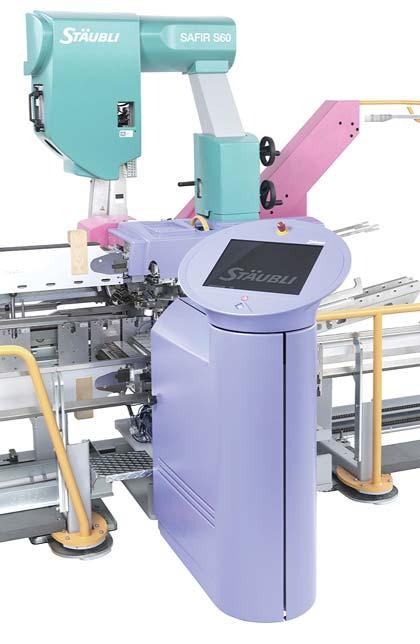
production of flat, terry, or OPW (onepiece woven) fabrics. Available in formats ranging from 4,608 hooks (LX PRO) to 25,600 hooks (LXXL PRO), these Jacquard machines feature Stäubli’s exclusive NOEMI electronics architecture and the state-of-the-art MX PRO module. This combination perfectly integrates the constraints of high-speed weaving, temperature, and the significant number of hooks to be lifted. ITMA visitors will see three complete Jacquard installations in operation producing trendy fabrics and learn all about the advantages and benefits these machines provide.
NEW ALPHA carpet weaving system
Stäubli will be introducing a new carpet weaving system at ITMA. Certain to be a highlight of the booth, the new ALPHA carpet weaving system will be in operation every hour producing rugs. It features numerous newly developed components never before exhibited. Visitors can walk across the weavers’ stand and observe the double carpet production.
36 PAKISTAN TEXTILE JOURNAL - March 2023
SAFIR S60 automatic drawing-in machine –zoom on machine without drawing-in truck. Featuring Active Warp Control 2.0 technology.
Swiss Review
Fritz Legler, Stäubli Textile.
NEW My Staubli Portal
Stäubli will present its new customer portal at ITMA 2023: MyStaubli. As a new key to machinery solutions, this platform offers personal access to online information about Stäubli’s range of solutions and services. Visitors will learn about the many benefits the new portal offers.
The Stäubli booth will provide a comprehensive overview of the company’s range of solutions for futureoriented weaving mills. That’s because Stäubli is committed
to remain in close contact with its customers and meet market requirements as a partner. The Stäubli team looks forward to presenting their latest solutions & innovations and discussing
visitors’ individual needs and wishes for cost-effective and highly-productive textile manufacturing.
Loepfe sensors avoid material and energy wastage
How important are sustainability aspects to your customers? Are machines bought because they enable climate-friendly production or because - by reducing the consumption of energy, chemicals and raw materials, etc. - they primarily reduce manufacturing costs? Loepfe answers on the topic of sustainability are highlighted as follows.

Sustainable management of limited resources is directly linked to corporate success for our customers. Be it the successful achievement of corporate or environmental goals. Loepfe’s clearers utilize the latest sensor technologies to monitor yarn. Mill and quality managers have full flexibility in balancing targeted yarn quality vs. contingent productivity losses.
Through deliberate settings of the market-leading YarnMaster® PRISMA clearer, significant savings in yarn and energy wastage can be achieved. And all this while simultaneously improving the mill’s environmental footprint.
Loepfe Brothers Ltd. develop sensors and actuators to support machine manufacturers and production mills in their

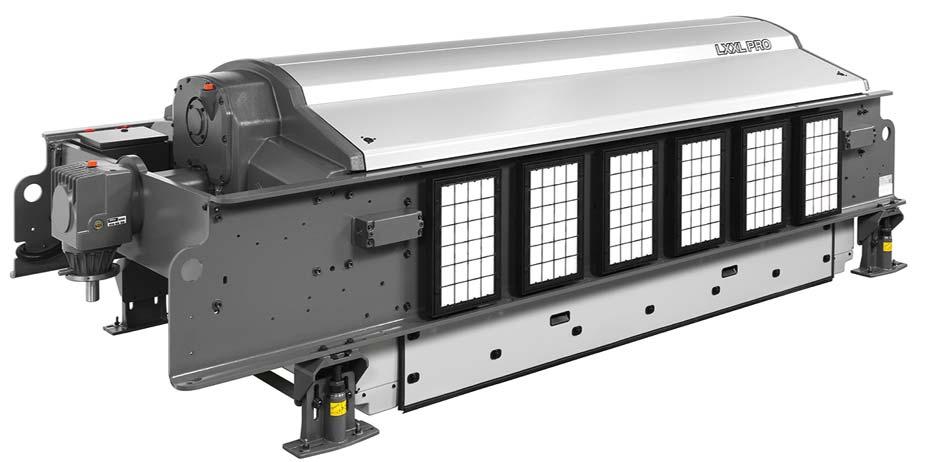
routine challenges. New sensors such as presented by Loepfe at ITMA 2019 and ITMA 2023 set new benchmarks.
What do you see as your company's greatest contribution to sustainable development?
Loepfe sensors and actuators directly address three dimensions of sustainability. The social, environmental the economic dimensions. Sensors well-placed in the production process have a direct impact on these dimensions. They keep the yarn quality at the desired level, they help to improve the production process, and ultimately, they assure zero defects in technical applications such as airbags, printed circuit boards, and safety belts.
Loepfe, a manufacturer of quality control solutions for the textile industry, has recognized the importance of sustainability and has made it a priority in their product development. Their solutions aim to reduce waste and improve efficiency, which can both contribute to sustainability and reduce manufacturing costs. By using advanced sensors and data analysis, Loepfe's solutions can help textile producers to optimize their processes and reduce resource consumption, while also improving product quality and consistency.
Swiss Review 37
LXXL PRO electronic Jacquard machine: Available in formats up to 25,600 hooks.
Sandra Meier, Head Products & Solutions.
YarnMaster® PRISMA clearer
Swinsol Compact Spinning solutions
Swinsol, headquartered in Switzerland, is a global leader in the manufacturing of compact spinning and recycling technologies. The company focuses on developing sustainable components and technologies for ring and open-end spinning systems, emphasizing the use of recycled fibers. Swinsol will display their range of state of the art technology at their stand in ITMA with consultation services.

Swinsol's offerings include:
RECOMPACT
A mechanical compact spinning device that saves energy and is compatible with all ring spinning frames. It offers quick installation, low maintenance, excellent yarn characteristics, compatibility with various fiber types (cotton, man-made, short recycled fibers), and increased lifetime of cots and aprons. The traversing technology is available in 3-channel, 4-channel, and 5-channel configurations. Recompact Case Studies from 2022, when compared to conventional compacting systems, show:

10% increase in production volume.
Up to 50% longer lifetime for cots and aprons.
ROI in less than 12 months.
Compatibility with various systems, such as Rotorcraft, Rieter, and Suessen.
Upgrades from other/old systems.
Applicable to any kind of pneumatic/compact system. Individual upgrade kits for existing systems. Unique and tailored conversions.
SpringUnit® – P3-1 Top Arm Modernization:

This modification replaces the suction/air-tube system in the hexagonal rod with a mechanical solution that provides individually adjustable pressure settings for each top arm. No energy or air is required, and it guarantees a 10-year lifetime with individually adjustable pressure per top arm.

The SpringUnit ensures exact pressure load on the top arm and equal distribution of pressure on both left and right rollers.
Swinsol's mission is to develop green solutions for recycling, and spinning 100% recycled fibers. Their goal is to increase sustainability through energy efficiency and CO2 reduction, maximize yarn quality, reduce downtime, increase the lifecycle, and implement automated processes in the textile industry.

Swiss Review 38 PAKISTAN TEXTILE JOURNAL - March 2023
Dr. Laszlo Olah, Managing Director, CDO Swinsol.
Luwa highlights new developments for Axial Flow Fan to reduce energy consumption
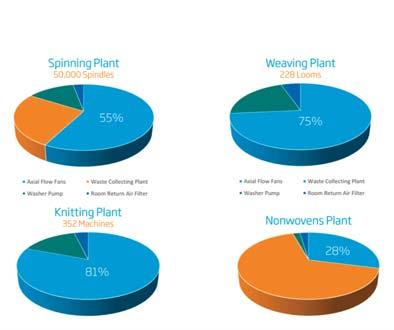

Luwa Air Engineering based at Uster, Switzerland specializes in providing Textile and Industrial Air Engineering Solutions, Process Air Conditioning, Dust & Fibre Extraction & Filtration and Energy Monitoring Systems.
Luwa has subsidiaries in several countries including India, China, Singapore, US, and Turkey. In addition to its subsidiaries, the company has agents in more than 60 countries. This extensive network enables the company to serve customers from different parts of the world. The company has been in operation since 1935.
Luwa's range of services includes designing, engineering, manufacturing, installing and servicing systems and components for air conditioning, humidification, dust control, heat recovery and exhaust air cleaning for various industries. The company has a strong focus on innovation and sustainability, which is evident in its product offerings.
Luwa is part of the Nederman Group, which is a global leader in providing solutions for clean air. The group's expertise in clean air solutions, coupled
with Luwa's specialization in textile and industrial air engineering, has made Luwa one of the leading names in the textile industry.


Luwa will be presenting at ITMA in Milan at booth H3 - D201
Luwa will be showcasing its latest technologies and solutions at ITMA in Milan, with a focus on sustainability, process efficiency, energy savings, and connectivity. One of the main highlights of the company will be its latest development of the Axial Flow Fan, which has evolved significantly to reduce energy consumption of the textile industries, such as spinning, weaving, knitting and nonwovens plants.
The development of this new Axial Flow Fan involves pioneering aerodynamic, technical technologies, and materials, which aim to increase energy

efficiency, quality, durability and sustainability of the system. Also by reducing weight, material usage, unwanted oscillations, and vibrations, the overall energy and operating costs are also reduced.
Luwa's new Axial Flow Fan is a promising solution for companies looking to improve their sustainability and energy efficiency while reducing costs. By showcasing this technology at ITMA, Luwa aims to raise awareness about the importance of sustainable solutions and inspire other companies to invest in more efficient and eco-friendly technologies.
Swiss Review 39
Guillermo Franganillo del Rio, Regional Sales Manager at Luwa Air Engineering.
Main energy consumers in a humidification and filter plants
Luwa is widely regarded as a pioneer in air and filtering systems for the textile industry.
Axial Flow Fan for reduce energy consumption in textile industries. Textile Air Engineering for Spinning, Weaving and Knitting.
Process Air Conditioing applications inludes Synthetic Fibres, Technical Textiles and Nonwovens.
Retech innovations under the blue thread theme related to Sustainability
Retech will present various interesting innovations under the blue thread theme related to sustainability for heated godets at the upcoming ITMA at stand B108 in hall 1.
Retech as expert in drawing fibres to perfection, will be showing innovations in the following fields.
IoT in a modern heated godet. New drive system for (super) slow speeds.
Special machine construction of drawing frames and the making of the blue thread.
Retech, a Swiss textile machinery provider, will display its latest innovations at the upcoming ITMA exhibition. The company's products focus on sustainability, energy efficiency, and advanced automation. At the exhibition, Retech will showcase its heated godets, which are essential components for synthetic fiber production. Retech's heated godets are designed to provide greater control over temperature, fiber treatment, and sustainability, and the company has made significant advances in energy-efficient motors and heating equipment.

Retech will demonstrate how IoT can be integrated into modern heated godets for sustainability. The company's godets have additional measuring elements that allow it to react preventively to possible damage and subsequent failure. For example, the UTR-6A temperature measuring transmission system measures temperatures in the rotating godet and transmits the data to the temperature controller UCR-6 for processing without contact. This ensures comprehensive bearing failure prevention and monitoring and represents significant added value for operators.
Retech will also present its new drive system for slow speeds. Retech's godet rolls are designed to allow customers to drive the draw roll, ensuring top performance regardless of how slowly the process needs to run. The new drive system is modular and can be assembled according to the customer's needs. This allows Retech to cater to a wide range of speed, torque, and gearbox angular requirements. Visitors can witness the making of blue thread and Retech's special machine construction of drawing frames. The company will demonstrate a modular drawing system, showcasing its competence as a special solution provider for R&D facilities, universities, and specialty manufacturers. Retech will also display its proven yarn tension sensors and air-bearing separator rolls.
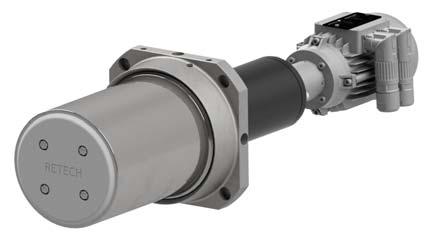
Retech's innovative designs incorporate single-zone or multi-zone heating via induction, infrared, or resistance, ensuring accurate surface temperature profiles and consistent yarn quality. The company also offers unbeatable value when it comes to cost savings and low maintenance requirements, reducing downtime and increasing lifetime bearings, and its IoTready monitoring feature protects against potential damage due to excess temperatures or other issues.
Retech's induction temperature monitoring feature allows the temperature of the induction coil to be measured and monitored, alerting operators if the temperature exceeds a value based on experience that can damage the coil and reduce its service life. The bearing temperature monitoring feature monitors the bearing temperature, detecting and delaying an approaching bearing damage at an early stage until the bearings can be replaced during planned maintenance work. The vibration monitoring feature also alerts operators to excessive vibrations that can damage the bearing and lead to bearing failure.
In conclusion, Retech's latest innovations demonstrate its commitment to sustainability, energy efficiency, and advanced automation. The company's godets are designed with accuracy, precision, and sustainability in mind, and its IoT-ready monitoring feature offers comprehensive bearing failure prevention and monitoring. Retech's new drive system for slow speeds allows the company to cater to a wide range of customer requirements, and its proven yarn tension sensors and air-bearing separator rolls provide customers with excellent quality and reliability.

Swiss Review 40 PAKISTAN TEXTILE JOURNAL - March 2023
Retech heated godet roll
Ralph von Arx, Managing Director, Retech
IoTs in a modern heated godet
Autocoro with new patented rotor cleaning
Fully automatic rotor spinning essentially consists of four key processes: spinning and winding, automatic piecing and automatic doffing of yarn packages. When it comes to the Autocoro, the first three processes have been integrated into each individual spinning position for more than 10 years through individual drive technology, resulting in high productivity.
When doffing a package, rotor cleaning is carried out simultaneously by the doffing cleaning units (DCUs), which travel from spinning position to spinning position. With the Autocoro, you can install up to eight DCUs. The machine can be configured differently depending on the machine length, package size, yarn count and raw material.

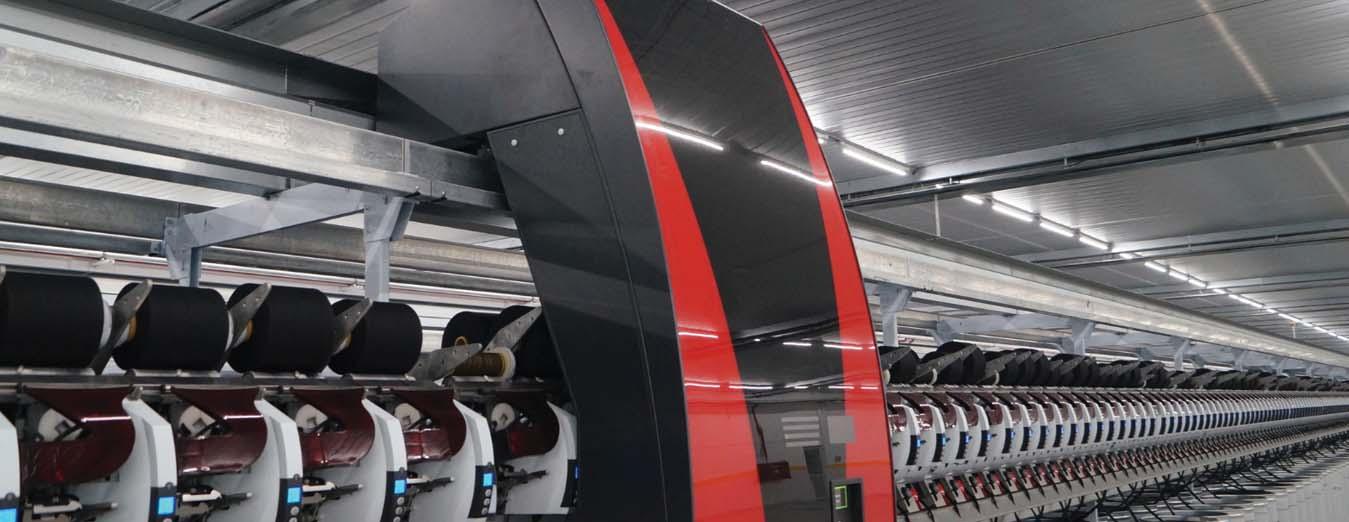
New patented rotor cleaning improves yarns
The several DCUs work like a well-coordinated team on the Autocoro 10. At the same time, each DCU can be precisely adjusted to the quality requirements of its lots and work areas on the Autocoro 10.
The most important task of the DCUs in the context of yarn quality assurance is to clean the rotors, both pneumatically and mechanically. In the new Autocoro 10, this is now even more efficient as a result of an innovative, patented technology. The cleaning processes are digitally controlled using linear motor technology. A new movement mode for the cleaning scraper has been integrated, and the positioning of the scraper in the rotor groove is more precise and significantly more efficient thanks to an additional circuit.
This new cleaning technology loosens and removes even the most stubborn dirt and sticky residue in the rotor. The cleaning time of the rotors can now be individually adjusted on the new DCUs. All this paves the way for impeccably clean rotors, leading to a more reproducible yarn quality regardless of the fibre type. During market launch tests, the cleaning technology
proved effective for all fibres that are difficult to spin, such as recycled fibres and regenerated fibres. Our customers can now rest assured that they’ll be ready to meet the requirements of the future thanks to the new rotor cleaning system.
Optimised automation for higher efficiency

The new DCUs on the Autocoro 10 are not just automatic devices focused on doffing packages and cleaning the rotor –they are the right hand of the spinning mill personnel, and a new type of operator guidance in two steps makes communication with the personnel quicker and easier. The LED signals, visible from afar, indicate to the personnel when manual intervention is needed.
The DCU itself has digitally controlled touch menus with plain text information. This way, the operator knows immediately what needs to be done: whether the auxiliary yarn required for doffing the package is coming to an end or some other manual intervention is necessary. This optimised operator guidance improves the timing of the auxiliary yarn supply and increases the efficiency of both the DCUs and the Autocoro 10.
The patent has been granted and the new rotor cleaning system will be integrated into all newly delivered Autocoro systems as of summer 2023. It will also be available as a retrofit kit for Autocoro 8 and Autocoro 9.
By Waltraud Jansen, Product Marketing & Communication, Open End Business Unit, Saurer Spinning Solutions GmbH & Co. KG
Swiss Review 41
Dr. Marcus Rennekamp, Managing Director ,SAURER Spinning Solutions, Head of Business Unit Open-End Spinning.
Steiger flat knitting machinery manufacturer shares action plan for a sustainable future
Steiger Participations SA, a company headquartered in Vionnaz, Switzerland, is a prominent player in the production and sales of industrial knitting machines. While its headquarters are based in Switzerland, the company also operates in China to support its activities. Steiger specializes in textile machines for the fashion industry and has established itself as the global leader for medical and technical textile applications.
Steiger Textil's specialization in industrial flat knitting machines for the high-end fashion industry positions it as a key player in the market. With 25% of its turnover coming from Fashion Segment with knitting machines used by prestigious brands like Hugo Boss, Versace, Dior, Chanel, and Hermes, it demonstrates the company's reputation and success in catering to the luxury fashion segment.
The company's Antares 3.130 machine is compact scalable knitting machine equipped with 3 systems, 32 horizontally and vertically motorized yarn-guides. The machine offers intarsia knitting with full creativity and high productivity.

A new concept of scalable machine is born with the Antares 3.130. This machine is a platform that can accept specific equipment depending on knitwear products. The recognized strengths of Steiger as the take-down and the open carriage are optimized on the Antares 3.130.
The Medical Segment specializes in orthopedic and compression knitwear, accounts for 70% of the company's turnover. They offer a unique service for customized products that allows orthopedists to make custom compression knitwear using a 3D scan of the patient's body.
Steiger is also active in the Technical Segment, offering services like knitted electrodes and sensors to producing 3dimensional carbon fiber knitted parts for the automotive or aerospace industry.
For example, Mapicc 3D is a European project to produce 3D carbon fiber knitted parts for automotive or aerospace industry. This European funded research project aims to develop a comprehensive process for manufacturing three-dimensional textile composite parts using its advanced flat knitting technology.
The Mapicc 3D project aims to create a manufacturing process, which can make parts from composite fibres such as Carbon or glass fibre in complex shapes in order to reduce production costs for industries like automotive.
The project, which is part of the European Union’s 7th Framework Project, involves fifteen partners including academics at ENSAIT (École Nationale Supérieure des Arts et Industries Textiles) Mecacorp, Technische Universität Dresden and Riga Technical University, as well as technical textiles corporations.
The company recently partnered with ETH Zurich and TU Delft to research and create a sculpture in which they replaced the traditional wooden framework with knitted panels to make the supporting structure.
During the Swissmem conference, Carlo Corradi from Sales and Marketing, Steiger discussed sustainability in the industry and shared their complete Corporate Social Responsibility (CSR) audit and analysis of the value chain within their company. The analysis included R&D with transport, machine assembly, and packing transport segments within the company. With the help of this CSR, they made an action plan that included implementing a less-polluting heating system within the factory, installing solar panels that will cover up to 92% of their electrical needs, reinforcing their internal recycling policy, and producing machinery with a machine recycling potential of 98% of its weight. They also shared that their latest version of technologies built with sustainability in mind and all the premium features of the previous technologies.

Swiss Review 42 PAKISTAN TEXTILE JOURNAL - March 2023
Steiger’s Antares 3.130
Carlo Corradi, Sales and Marketing.
Crealet presents individual and comprehensive solutions
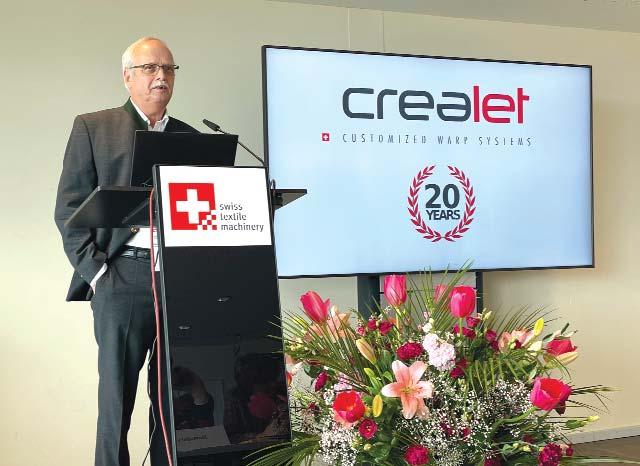
Beyond customized warp systems
Sophisticated warp feeding technology and tailored solutions will be presented by Crealet at ITMA 2023 – exactly as the Swiss company’s customers would expect. But there will be more: innovations in warp feeders for ribbon machines and the latest ECR control systems will be highlighted for visitors – while the main attraction, as always, will surely be access to valuable firsthand knowledge from Crealet experts in both weaving and knitting applications.
In the 20 years since its start-up, Crealet has built a reputation as a global leader in electronic warp feeding systems for both wide and narrow fabric weaving. Warp feeding is a technique that is both complex and vital to successful fabric production, so mills worldwide want a partner which is both innovative and ultimately reliable.
Yarn tension is a big story in warp feeding. Getting it right makes a massive difference to how the warp performs. In recognition of this, Crealet has devised effective solutions which quickly and precisely synchronize the tension of different warp beams – and which connect to an integrated network. “It’s our goal to enable customers to realize their creative ideas now and in future,” says Crealet CEO Andreas Wirz.
Future-minded
Markets are now more dynamic than ever, with the rate of new products and variations accelerating. At the same time, customers have increasingly strict demands on fabric quality. It makes weaving a sector that is getting tougher and more competitive all the time. To make the task even harder, product varieties are expanding and batch sizes are fluctuating.
That’s why weavers need the reliability they get from Crealet, with warp feeding solutions that keep pace with trends and sophisticated technologies to optimize processes.
Modern solutions must fit with IOT and Industry 4.0, so Crealet is dedicated to making the warp thread feed reproducible, traceable and reliable.
New solutions at ITMA 2023
The background to Crealet innovations is a focus on optimizing customers' end-products and transforming the feeding processes.
The newest development is a warp yarn feeding solution for ribbon weaving machines that will be introduced at the upcoming exhibition in Milan.
The system features the ECR system for electronic control of rope braking on warp beams in ribbon weaving. Upgrading rope brakes with the ECR control keeps warp tension constant from full to empty beam.
This improves fabric quality and reduces labor requirements. Technical benefits are the easy adjustment of warp tension and the monitoring and visualization of warp tension.
Customized warp let-off applications are a big Crealet success story, especially for technical, sophisticated and sensitive fabrics. In fact, smart electronic warp letoffs are now a core business.
For high-tech fabrics, customers need warp let-off devices to perform standardized processes at consistently high quality levels. “We are the ideal partner for the many different requirements in warp feeding. We have all the know-how and experience to optimize machine efficiency and fabric quality,” says Wirz.
Meet the experts…
Constant tension throughout the warp is essential for quality end-products, and accurate feeding of warp threads from beams is possible only with impeccable warp beam preparation. That’s where the partnership with COMSAT brings extra value to Crealet customers, with sectional and direct warping machines and creels, as well as inspection machines, batching motions and selvedge thread warpers.
Crealet’s extended customer offering now takes in even more weaving preparation options, through the link with Appalachian Electronic Instruments. This US company has specialized in quality and process control for the textile industry, developing and manufacturing quality assurance solutions in warp knitting and warp preparation.
The big plus for visitors to ITMA 2023 will be the chance to meet Crealet experts face to face. Wide-ranging discussions can extend far beyond customized warp systems into the exchange of comprehensive know-how across the whole field. The Crealet presence at booth B306 in Hall 6 will be a rewarding one-stop shop for unrivaled knowledge in preparation systems for fabric manufacture.
43 Swiss Review
Walter Wirz, Emeritus CEO of Crealet.
Road to Net Zero with the leader in continuous wet processing and jet dyeing technology

BENNINGER ITMA Milano 2023 Hall 18, Booth A201
Benninger is one of global leaders in the development, design, manufacture and service of technologically advanced, highly developed textile finishing and tire cord solutions for the global textile, chemical fibre, tire and conveyor belt manufacturing markets.
With innovative and reliable products as well as comprehensive knowledge in textile process engineering, Benninger supplies tailor-made process solutions based on close cooperation and coordination with our customers.
Rolf Erik Schoeler, Benninger Group spoke at the Swissmem Conference at Bern, Switzerland. He said: “Benninger's contribution to the road to net-zero emissions is significant, as the company has developed solutions that support decarbonization while maintaining profitability. This is achieved through the use of the best available technology (BAT) and deep process know-how. Benninger has also developed salt-free dyeing solutions for the knitwear sector.”

“Our approach is always driven by the textile applications of our customers. Thanks to many years of experience and in-depth textile competence, Benninger creates sustainable added value for its customers. Benninger has a large number of reference installations for the individual application processes,’’ stated Marion Rüesch from Corporate Marketing department.
Benninger operates as an integrated solution provider. We plan and implement technologically optimised and individual process and system solutions.
Benninger aims to become the complete system
supplier with leading technology for continuous wet processing, discontinuous dyeing and remain the leader for solutions for the tire cord industry. We take seriously our responsibility towards sustainable textile production and have always stood for textile finishing plants that are particularly resource efficient.
44 PAKISTAN TEXTILE JOURNAL - March 2023
Benninger Küsters DyePad.
Rolf Erik Schoeler, Benninger Group.
We supply overall solutions for all important textile wet finishing processes, and we specialize in the continuous openwidth treatment of woven and knitted fabrics, technical textiles as well as jet dyeing machines, jiggers, along with the complete and integrated dye house supply systems such as liquid dispensing, salt and soda ash distributing systems as well as dye staff distribution systems. Our portfolio also includes caustic soda recovery plants and waste-water heat recovery systems. Thanks to our comprehensive process know-how and deep engineering understanding we offer high quality installations with excellent customer service. With our solutions, producers will make a huge contribution to Decarbonizing Textile.
BENNINGER will be presenting its latest developments
The new Benninger jet dyeing machine Fabricmaster, with unmatched water consumption figures. It is the most sustainable way of discontinuous dyeing today. Fast, cost effective and on the road to zero footprints.
The chemical dispensing system, CDS, serves all kind of discontinuous and continuous machines in an accurate, unbeatable, and fast way.
The new Benninger-Küsters CPB dyeing station for knitwear, the only salt-free cold dyeing process.
The new Benninger singeing machine, SingeRay, ensures perfect singeing effects, cost efficiency and uniform quality.
The sustainable way of discontinuous dyeing with the new Fabricmasterfast, cost effective and zero footprints
Benninger has produced the fastest, most versatile, and economic Jet dyeing machine of the industry and which ensures dramatically shorter process times. The Fabricmaster is not only a robust and reliable system, but the benchmark of the industry in future. Its harmonic versatility is the beacon to conquer new markets. Our passion for
perfect fabric quality makes sure that you produce the widest range of fabrics at lowest cost and unmatched water consumption levels.
Salt-free dyeing of woven fabrics and knitwear
Salt-free dyeing without the use of energy is only possible using the cold pad batch (CPB) dyeing process. This process is also becoming increasingly popular in tropical and subtropical regions, which is reason enough for Benninger-Küsters to adapt the CPB systems even more effectively to the climatic conditions.
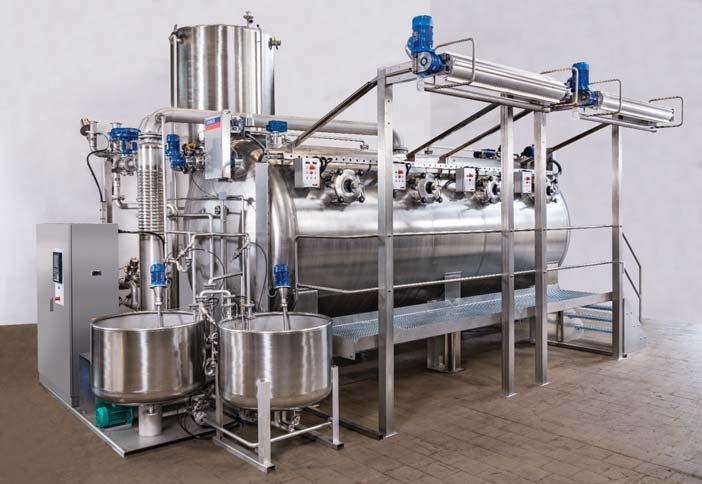
The heart of our CPB system is the BENNINGER KÜSTERS DYPAD, which we will also be presenting again this year at the ITMA Milano. BENNINGER is the only textile machine manufacturer with the know-how of the original S-roller technology, which is synonymous with an even dyeing result across the entire fabric width.
Brand new Singeing machine SingeRay – the best choice to upgrade your fabric, whilst saving gas
The “100% made in Germany” singeing machine is equipped with two burners and a double nozzle strip. The silicium carbide burning chambers ensure complete combustion, and a constant burner temperature thanks to 4 cooling channels. Low gas consumption and a perfect flame will increase the scope of your fibres and blends.

45
Brand new Singeing machine SingeRay – the first choice to upgrade fabric, whilst saving gas.
Swiss Review
The sustainable way of discontinuous dyeing with the new Fabricmaster - fast, cost effective and zero footprints.
Swissmem Press Conference Glimpses





Swiss Review 46 PAKISTAN TEXTILE JOURNAL - March 2023



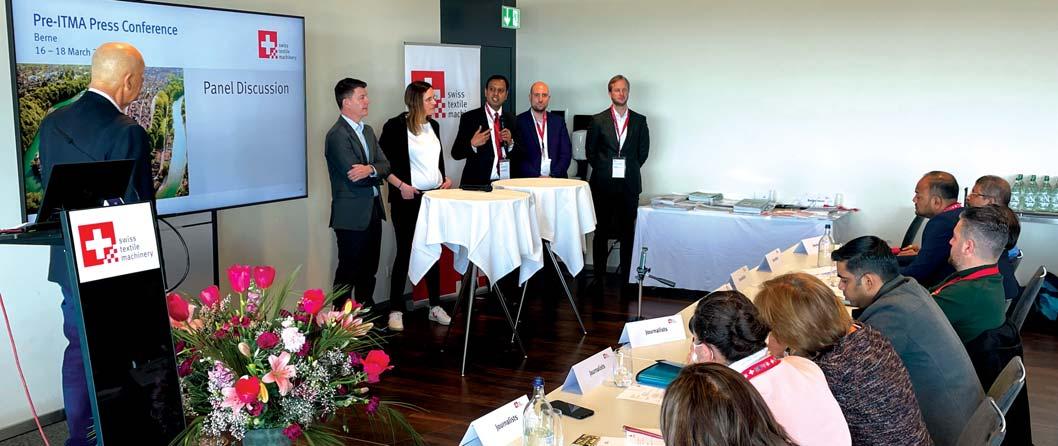
Swiss Review 47
Parliament Building Bern
Day out at the Cheese Factory and Berne city

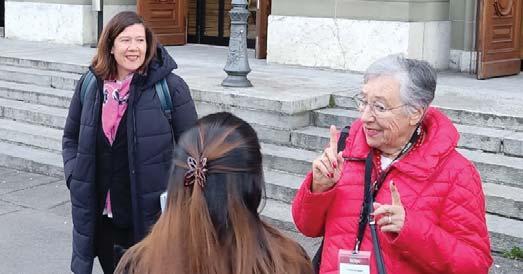




48 PAKISTAN TEXTILE JOURNAL - March 2023 Swiss Review
SPECIAL REPORT
Archroma completes Acquisition of the Textile Effects business of Huntsman Corporation.
“When the Huntsman Textile Effects acquisition was first announced in August 2022, Archroma Group Chief Executive Officer (CEO) Heike van de Kerkhof called the transaction a “merger of equals.”
Archroma starts the FiberColors* revolution
‘With the Earth population reaching 8 billion in November 2022, the need to address the issue of textile waste becomes more critical.
Archroma Internship program completes 25 years
Tree Plantation Campaigns. Partnering for Educational Cause. Sustainable Neighborhood. Support towards Fire Safety. Emergency Response – Floods. Awards and Accreditations.

Swiss Review 49
Archroma completes Acquisition of the Textile Effects business of Huntsman Corporation
Archroma, a global leader in sustainable specialty chemicals and solutions for industries such as textiles, packaging & paper, paints and coatings, today announced the closing of the acquisition of the Textile Effects business from Huntsman Corporation (“Huntsman Textile Effects”).
When the Huntsman Textile Effects acquisition was first announced in August 2022, Archroma Group Chief Executive Officer (CEO) Heike van de Kerkhof called the transaction a “merger of equals”. Indeed, the global business of Huntsman Textile Effects comprises approximately 2,300 employees in 33 countries and 10 production sites globally which, when combined with Archroma, means the company will have more than
5,000 employees in total, in 42 countries and 35 production sites. The companies’ combined product portfolios will be highly complementary, offering fashion brands and the global textile industry the high performance and innovation they expect, whilst respecting natural resources and the planet.
Archroma is a portfolio company of US-based private investment firm SK Capital Partners. Since its formation in 2013, the company has been building a comprehensive portfolio of solutions to serve the apparel, textiles, packaging, paper, coatings, adhesives and sealants markets. The acquisition of Huntsman Textile Effects adds to the rich heritages of Archroma, with Archroma having previously acquired the global textile
chemicals business of BASF, M. Dohmen, and the stilbene-based paper optical brightener business of BASF.
In addition to the closing of the Textile Effects acquisition, Archroma announced that it has updated its overall business into two operating divisions for growth, each focused on a separate end market.
The Textile Effects business acquired from Huntsman will be integrated with the Brand & Performance Textile Specialties business of Archroma into one new division named Archroma Textile Effects. The new division will be led by Rohit Aggarwal, former President of Huntsman Textile Effects, who is appointed as Divisional President & CEO

Swiss Review
50 PAKISTAN TEXTILE JOURNAL - March 2023
of the Archroma Textile Effects division, as well as President Asia.
The Packaging & Paper Specialties and Coatings, Adhesives & Sealants businesses of Archroma have been recently combined into one new division named Archroma Paper, Packaging & Coatings, under the leadership of Sameer Singla, Divisional President & CEO of the Archroma Paper, Packaging & Coatings division, as well as President Americas and Europe, Middle East & Africa.
This new structure will ensure that both divisions obtain the resources and focus needed to continue providing Archroma’s customers and business partners with the superior experience and solutions they have come to expect.
In particular, Archroma is committed to supporting global megatrends and societal shifts such as circular fashion, plastic-to-paper replacement, and waterbased paints and coatings, with the innovations and solutions needed to do so.
Heike van de Kerkhof comments: “We are very proud of Archroma’s
achievements in recent years which have been driven by innovation and organic initiatives, as well as the integration of strategic acquisitions. We have made substantial investments in development and production of high performance and earth-friendlier dyes, as well as a host of systems and solutions that reduce the environmental and energy footprints of the mills, leading the industry’s efforts to offer more sustainable products to the consumers.
The acquisition of Huntsman Textile Effects enhances Archroma’s position as a leader in innovation, service and sustainability and creates a powerhouse with superior capabilities to serve our customers and markets.”
Thomas Bucher, Group Chief Finance Officer, adds: “With this acquisition, Archroma is now in a position to leverage the complementarities and synergies of not just one but two leaders in textile chemicals and dyes. The integration will allow us to offer the cost effective innovation, quality, reliability, expertise and market coverage that our partners
need to win in the current market conditions.”
Rohit Aggarwal further adds: “I am very excited to see our two leading teams unite. We share the same passion for innovation and the same vision for a more efficient and sustainable textile and apparel sector. At this critical time for our industry, we have a unique opportunity to step up as champions of transformation that help textile manufacturers and brands around the globe find new avenues for growth and new ways to delight and inspire consumers.”
Sameer Singla concludes: “Archroma has a long history of providing our dyes, specialty chemicals and water-based emulsions to paper, packaging, paints, coatings and many other applications. With our new Paper, Packaging & Coatings division, we will be able to partner with our global customer base to drive innovation in our market, providing the increasingly sustainable solutions that consumers demand and deserve.”

Swiss Review
51
Archroma starts the FiberColors* revolution
With the Earth population reaching 8 billion in November 2022, the need to address the issue of textile waste becomes more critical.
According to www.earth.org, 92 million tons of textile waste is produced every year, a number that is expected to soar to 134 million tons by the end of the decade. Around 85% of all textiles discarded in the US are said to end-up in landfills, leading to land and water pollution impacting first and foremost local communities.

Archroma, a company who creates colors for fashion, decided to look at the issue creatively: what if it could create colors from waste fashion?
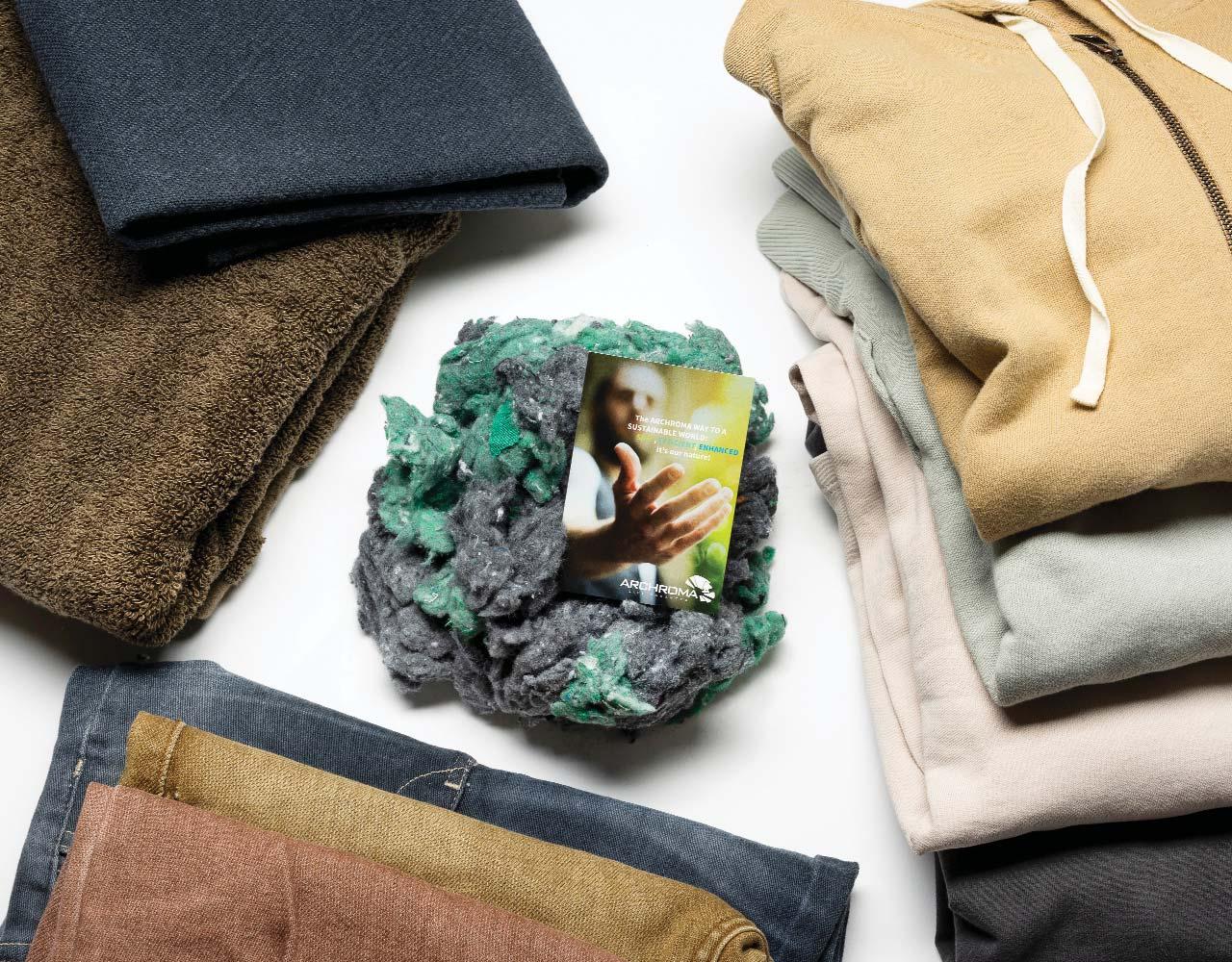
Swiss Review 52 PAKISTAN TEXTILE JOURNAL - March 2023
Archroma had already developed a way to turn waste from the herbal and food industry into its range of EarthColors® featured by brands such as G-Star, Patagonia, Esprit, Tom Taylor, Pangaia, UGG, and Primark.
Archroma is now introducing another ground-breaking innovation: the FiberColors* technology.
With this technology, Archroma upcycles textile waste into gorgeous colors. The colors are synthesized from a minimum content of 50% waste-based raw material.
Archroma’s R&D experts have developed a way to use cotton and/or polyamide and their blends (with a >95% purity) to substitute the major part of the
petroleum-based raw material usually used to make dyestuff.
The resulting FiberColors* range, which is patent-pending and therefore exclusive to Archroma, includes five dyes covering a palette of timeless shades: Diresul® Fiber-Teak (brown shades), Diresul® Fiber-Ochre (olive shades), Diresul® Fiber-Maroon (bordeaux shades), Diresul® Fiber-Slate (blue grey shades) and Diresul® Fiber-Graphite (dark grey shades).
The dyes are especially suited for cellulose fibers such as cotton, viscose, linen and kapok, and can be used in continuous, exhaust, denim and garment dyeing and printing processes.
With this, a brand can turn its own pre- and post-consumer textile waste into its own beautiful colors, and create a complete collection including t-shirts, chinos, sweatshirts, hoodies, polo shirts, and home textiles.


FiberColors* are ideal for forwardthinking companies who want to help find a solution to textile landfills, and at the same time give value to waste including articles collected in their take-back schemes that cannot be reused.
Heike van de Kerkhof, Chief Executive Officer of Archroma, comments:
“After creating colors from food and herbal waste with EarthColors®, we are taking a step further in circular manufacturing with FiberColors*, addressing the huge textile and fashion waste global issue. This is how we make our purpose to lead our industry towards a more sustainable future for our customers and markets, a reality. Because it’s our nature.”
Swiss Review 53
Archroma Internship program completes 25 years
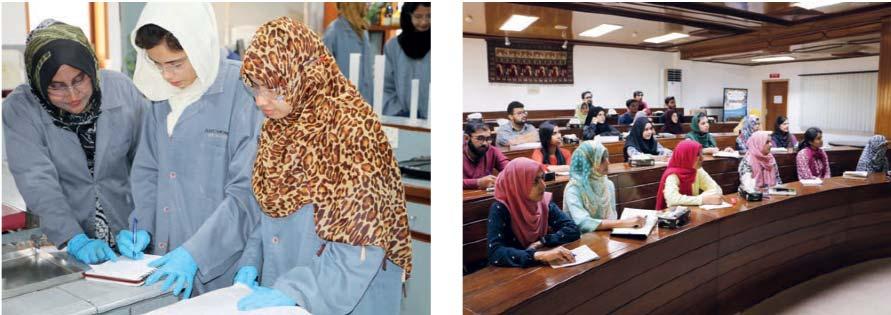
Archroma Center of Excellence has played a pivotal role in providing hands on technical education to students from almost every Engineering University where academic education in Textiles is given. The doors of Application Labs are wide open throughout the year. Our flagship Internship program has become a mandatory feature for students with six weeks of theory & practice. It is much sought after training amongst institutions and students. Our course completion certificate is highly recognized and is a criterion for placements in the job market mainly in textile mills.

The internship program was initially started in 1996 and is successfully run
round-the-year. Students are given practical demos in Textile Wet Processing along with tutorials and tests at the end of the internship. To date, more than 8000 students have completed this program and are now working in responsible positions within the textile Industry. 25% of interns are female students. They play their role in enhancing the standards of the Textile Industry.

Swiss Review
54 PAKISTAN TEXTILE JOURNAL - March 2023
Tree Plantation Campaigns
One goal at Archroma is to make the neighboring area clean and green. From the very onset when Archroma came into existence, regular tree plantation campaigns are organized during spring and monsoon seasons. In addition, Archroma also partners with schools, colleges and universities and closely work with students motivating them to plant trees and also adopting their designated areas to monitor the saplings planted by them. This gives the students a sense of responsibility towards nature and the environment. Students are given lectures and demos on the importance of a green environment. We closely collaborate with government depart-
ments, environmental protection agencies as well as civic bodies. Archroma employees have also planted trees within our precincts to wards "Employee volunteering"

So far hundreds of trees have been planted in the adjoining areas of Jamshoro and Landhi sites. More than 60% of the Jamshoro site has open green spaces with fruits and tree plantations. More recently we are growing wheat on four acres.
In recognition of our efforts, Archroma received Tree Plantation Award from the National Forum of Environment & Health for the past three consecutive years.
Partnering for Educational Cause
Improving the literacy rate is a national cause. Archroma strives to enhance academic standards by taking various educational initiatives. Partnering with Citizens Foundation is one such step in this direction. In July 2022, we provided financial assistance towards the installation of a solar power supply to TCF School, Korangi, Karachi. It will ensure uninterrupted electricity to the school especially ensuring relief during summers and added motivation for school children and teachers.

Swiss Review 55
Happy & bright faces of school children destined for better future
Tree plantation with Global Procurement Head & Neighbourhood Community
Sustainable Neighborhood
Archroma takes water scarcity very seriously and therefore is constantly exploring new and environmentally compatible solutions. As a chemical company committed to innovation and performance together with sustainability, Archroma puts a lot of time and engagement into developing chemical solutions that help our customers use less water. The sustainable Eluent Treatment (SET) Plant @ Zero Discharge facility in Jamshoro is unique in the world of textile dyes and chemicals manufacturing.
Realizing water scarcity in the country especially river Indus which is fast depleting and impacting 5000 years old Indus Civilization, we started the SET plant with
Zero Discharge Concept to recycle and reuse 80% of our water consumption at the site. Approximately 3.3 Million gallons of water is saved per month. Water thus saved is helping to improve the aquatic and community life in the region.
Jamshoro comes in the water stressed areas of the country. We supply approximately 13000 gallons of drinking water per day to the neighboring community absolutely free of cost.
An Effluent Treatment Plant is also functioning at the Landhi site since 2002. Water is effectively recycled and used for utilities and gardening. Here too, a big open space is available wherein fruits and

vegetables are grown through an organic method of farming. The installation of the Plant is the manifestation of the Responsible Care initiative. It has helped us to improve ecological conditions and meet National Environmental Quality Standards (NEQS). As a consequence, the usage of fresh water is reduced thus saving valuable resources in the Landhi area.
Being an environmentally friendly company, we provide help to other member industries and educational institutions by sharing knowledge, treatment techniques and training of our two Effluent Treatment plants.

Support towards Fire Safety
“Safety First” is a way of life at Archroma supported by Safety Rules. We provided assistance to the Landhi Association of Trade & Industry by donating a sizeable amount that will go towards the purchase of Fire Engines catering to the industrial areas with large manufacturing units mainly textile mills. Our own production site is also situated in the Landhi area. By helping the Association we have strengthened our commitment of being a responsible corporate citizen. The fire engines are stationed in vicinity and will be available at rapid speed in case of a fire emergency.
56 PAKISTAN TEXTILE JOURNAL - March 2023 Swiss Review
Supply of Drinking Water to Neighborhood Community.
Emergency Response – Floods
Archroma Pakistan shouldered its responsibility in the time of acute crisis when devastating floods hit Sindh in August 2022. We worked closely with provincial disaster management authorities to support them in relief work for the affected communities. Our CEO, Mr. Mujtaba Rahim visited the relief camps set up in the flood-affected areas of Jamshoro, where he met people of the neighborhood.
More than 500 ration bags, mineral water and cooked food were distributed amongst the flood afflicted families in the areas of Jamshoro, through the Office of Deputy Commissioner. We

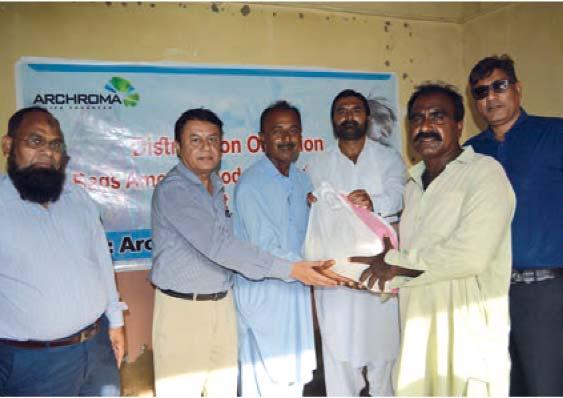

also mobilized relief supplies in the form of 2,000 liters of purified drinking water on a daily basis.
On the other hand, we joined hands with the Department of Community Medicine, Liaquat University of Medical & Health Sciences (LUMHS), Jamshoro to arrange emergency medical camps in flood affected areas of Jamshoro. We provided free medication to the flood-hit families who have been inundated by the relentless monsoon rains. We played a proactive role in times of national emergency.
57 Swiss Review
Awards and Accreditations
Archroma takes leads in the corporate world with its open-door policy. We assimilate new ideas within our teams that enhance and build quality standards in every area of activity. The result is a large number of recognitions from the government and trade bodies.
Archroma Wins 11th Corporate Excellence Award
Archroma Pakistan entered its second decade of consecutively winning the Corporate Excellence Award - Chemical Sector from the Management Association of Pakistan for the 11th time.

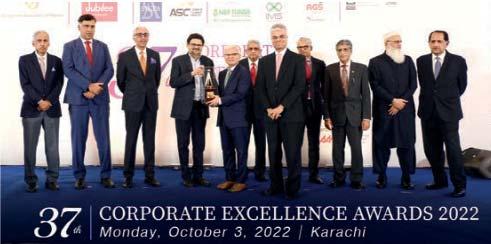
The Award was presented to our CEO Mr. Mujtaba Rahim and Director & CFO Mr. Irfan Chawala in the presence of a large corporate sector gathering. It is a recognition of good management practices that include finance, compliance, human resources and Corporate Social Responsibility.
Archroma Pakistan’s Annual Report Receives ‘Best Corporate Report’ Certificate
In recognition of exemplary corporate and financial reporting, consecutively for the 2nd year, the Annual Report of Archroma Pakistan received a Certificate of Appreciation in a competition held by ICAP and ICMAP. The contest is organized to rate the quality of information and layout of Annual Reports. Our Director and CFO Mr. Irfan Chawala received the best corporate report certificate.
Occupational Safety, Health & Wellness Award 2021
After a tough nationwide contest, Archroma Pakistan won 3rd position in Occupational Safety, Health & Wellness Awards for the year 2021 in the Chemical & Allied Sector category organized by the Employers Federation of Pakistan. The Award was conferred by the President of Pakistan, Dr. Arif Alvi on 21st May 2022 at Hotel Marriott, Karachi. Mr. Qazi Naeemuddin, Head of Operations, Jamshoro site received the prestigious award.
Archroma Pakistan Wins Environment Excellence Award 2022

In a nationwide contest, National Forum for Environment & Health declared Archroma Pakistan the winner of the 19th Annual Environment Excellence Award for 2022. Abdul Salam received the award from Mr. Abubakar Ahmed Madani, Secretary of Energy, Government of Sindh on 16th August at Karachi. The award is a recognition of our efforts towards environmental protection.

58 PAKISTAN TEXTILE JOURNAL - March 2023
Swiss Review
Living The Global Compact Best Practices Sustainability Award 2022
Archroma is amongst the 20 founding signatories of Global Compact rolled out to the corporate world in December 2005 by the Employers Federation of Pakistan. Its ten complying principles relate to Human rights, Labour, Environment and Anti-Corruption.
Within Archroma, we observe all principles with full sanctity and discipline. We won 3rd position in a nationwide competition on best practices of UN SDGs & Global Compact principles. Ms. Shahana Kaukab received the award from Mr. Mike Nithavrianakis, British Deputy Commissioner, Karachi.

Skills Development Employers’ Recognition Award
Archroma Pakistan partners with institutions for vocational training and skills development of young students since 2013 along with hands-on experience on the shop floor. Another training consists of six week’s internship of chemistry & chemical engineering students at Archroma Center of Excellence. In recognition of our efforts, the Employers Federation of Pakistan conferred the Employers' Recognition Award. The award was presented by Ms. Ghazala Saifee, a Member of, the National Assembly.
Corporate Social Responsibility Award 2022
Archroma Pakistan was adjudged winner of Corporate Social Responsibility Award under the theme, "CSR Roundthe-Clock practices". National Forum for Environment & Health organized this contest.
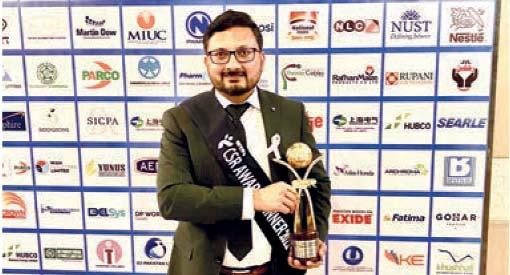
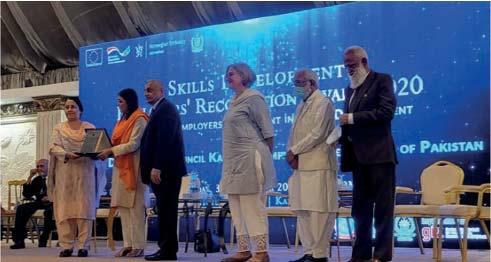
Mr. Ihtasham Elahi received the prestigious award from State Minister for Information & Broadcasting, Mr. Farrukh Habib.
Green Offices
Archroma is amongst the forerunners to adopt “Green Office” initiatives of WWF effective in 2016. It enables us to take concrete steps in environmental protection through internal management practices e.g. saving in water usage, utilities – electricity, gas, fuel and waste management.

Archroma Center of Excellence Labs is designed in such a manner that we take maximum benefit of daylight, here no bulbs are used. Water lines from taps are laid towards green spaces where it is utilized for plantation.
Archroma Pakistan Recognized
Pakistan Chemical Manufacturers Association (PCMA) recognized the efforts of Archroma Pakistan at their Annual General Body meeting held on 30th September at Governor House, Lahore. Mr. Ihtasham Elahi received the memento from Governor Punjab, Chaudhry Mohammad Sarwar.
59 Swiss Review




Archroma............................................................17&FC Chhipasons.................................................................60 CCI USA.......................................................................3 The Textile Institute......................................................9 ITMA 2023...............................................................IFC ITMA ASIA + CITME 2023........................................IBC iTextiles......................................................................BC Jakob Mueller AG.......................................................15 Jet Logistics................................................................60 Rastgar................................................................. 6 & 60 Rebus International Inc. ................................................9 Rieter............................................................................1 Santex Rimar Group..................................................17C Uster...........................................................................11 Classified ADVERTISERS INDEX MARCH 2023
